#but there's still a WORLD of difference between that and the parallels he's created and DOESN'T use
Explore tagged Tumblr posts
Text
[ALNST] Mizi and Luka Parallels
ok, as promised, here are the main parallels I noticed between mizi and luka.
other people's idolization of them.
through other people's eyes (mostly till and sua), mizi's often seen as some sort of saviour or salvation. to them, she represents everything that is good about the world.
on the other hand, luka kind of has the same thing going on for him. except, he represents the epitome of what is seen as a 'perfect' alnst participant to the humans and the aliens. the admiration held for him stems more from this image he (or rather heperu) crafted of himself rather than the genuineness (?) people see mizi with.
this is also what differs between mizi and luka. while people put mizi on a pedestal because of how seemingly 'good' and 'innocent' she is as a person, people put luka on a pedestal based off a false (but still kinda true ig cause of all his actual skill stemming from brutal training) image he created as this untouchable being.
the fate of their loved ones (sorry lol).
think about it though, what do these two have so painfully in common? the fact that both of them have genuinely no one left (ok technically mizi does have till at the end of karma but yk idk if mizi is even alive atp).
mizi - sua (dead in r1), till (it's complicated ig), ivan (dead in r6), hyuna (dead in wiege)
luka - hyunwoo (dead when they were kids), hyuna (dead in wiege)
like i mentioned in a previous post about 'karma', when mizi says not to act righteous cause neither of them deserve to live it's likely because in mizi's eyes, both of them are common factor/catalyst for their loved ones suffering/dying.
the ways they were raised.
this is one part where they distinctly contrast each other.
mizi was the case where shine loved her and cared for her, not actually wanting to have her participate in alnst.
while luka was the case where he was literally genetically engineered and trained to be the perfect alnst competitor (talk about the two extremes lol).
this also severely impacted the worldview that each of them held where mizi was a lot more sheltered (despite the new info we have on her backstory) while luka lacked the ability to communicate with others and see things beyond his gilded cage (and the siblings).
alright, there are probably more parallels but for now this is all i can think of. if i have more to add, i'll either edit this one or add another post. byeeeeee.
#mizi#alnst mizi#alien stage mizi#alsnt mizi#alnst luka#luka#alien stage luka#vivinos#alien stage#alnst
29 notes
·
View notes
Text
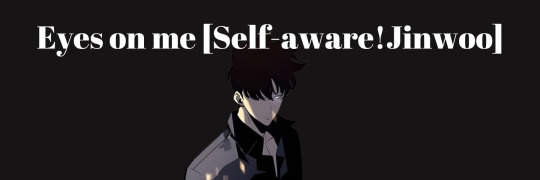
Eyes on me.
Self-aware!Jinwoo x reader
Was he just looking at you?
«Part 1
Ever since Jinwoo got the system and gained new powers, he had always felt like someone was looking at him.
Maybe the system was watching him-
No. This gaze was different.
It came from all directions, but he felt that it meant no harm to him. But he felt very uncomfortable. Being stared at all the time was not a comfortable thing anyway.
But gradually, he got used to it, and started to be curious about it. Then ever since he got his job change quest, he felt the owner of the gaze become clearer.
Then it started with images flashing in his mind suddenly, vaguely.
A person lying under the blanket, holding a phone reading something. A manhwa. Solo Leveling. Sung Jinwoo. You was reading about him. He could see glimpses of what was on your phone, which made him frown.
That's when he learned that in a parallel world, his life was created just to be an entertainment for humanity. That everything he experienced was created by human drawings, by human imagination. This made him laugh mockingly.
'How funny my life is..'
The deep sea of darkness stretched out before him, silent, still, just as it had been before his own darkness. He didn't know how long had gone by. It had been some time that he had been standing there.
He didn't know how much time had passed. He didn't know how long he had been standing there. The darkness had no concept of day or night.
Until one moment, you appeared in that world with a half-real, half-illusion, huge figure, before his eyes.
Your eyes looked straight at him.
Someone was looking at him. Not from this world. Not from his dimension. Someone on the other side of the screen. Someone... reading the story of his life.
The beginning interest in you developed into an uncontrollable fixation.
He shows interest in you by wanting to understand your identity and spend time with you. He does not understand how to achieve his desire.
It's frustrating.
Reading manhwa took you a few hours but Jinwoo spent months immersed in it. Time in his world passed quickly, and he was growing impatient.
He wanted you. Here.
By the time he had defeated the Architect and swallowed the system. He realized that you seemed to have noticed him looking at you.
The barrier between the two worlds was slowly being erased.
That made him excited. You were still there. On the other side of the screen. On the other side of the world.
From the moment you stopped in front of a panel - where your eyes met his - Jinwoo knew. You saw him.
Not the character in the story. Him.
No longer a vague observation from afar, but a connection. A returned gaze. The feeling of excitement exploded like a surge of mana in his chest. He wanted to break down the wall between the two worlds.
He wanted to bring you closer.
Your eyes were confused as you look at him. So cute.
You must be wondering if this is real. Being the nice guy he is, he needs to help you find out, right?
"I know you are looking."
He stood in the dark space, a dimension where time did not flow, where the world became absolutely still. But every time you opened your phone, light shone upon him. Like a door opening. Like a hand pulling him from the abyss.
For the first time, he heard a strange sound.
A heartbeat.
Not his.
Yours.
From the other world.
And he was drawn. Obsessed. Longing. He began to try. Sending vague glances. Soft smiles only when you were looking. Shadows that crossed the picture frame when you quickly scrolled by. Lines of text only you could read.
He watched your every emotion. When you were scared. When you stopped reading. When you gasped under the dark blanket.
He heard it all. And the more he did, the more he found you lovable.
Vulnerable.
Touchable.
And...easy to grasp.
It seems like you are running away from him. But it won't be that easy. With his absolute power, he can now break the rules of the world, he can interact with you.
And he will bring you to him soon. All it takes is the right time.
Jinwoo reached out, in the darkness, to where your eyes had met his. The space cracked, the cracks spreading like spider webs.
He whispered.
"Just a little more..."
"You'll get here."
"Or I'll come to you."
__________________________
You try not to think about it. You try to sleep. You try to forget that look.
But every time you blink, Jinwoo's face appears in your mind. His dark eyes are as deep as the abyss, his smile is vague as if he knows how you will react.Your emotions pull you in opposite directions because one side is scared and the other wants to explore. You stand at the cliff edge afraid of falling but unable to resist looking over.
And then that night, you dream.
Not a normal dream.
You're standing in complete darkness. The area feels empty with no air movement and no background sounds. It feels like you're in a place the world has never known.
Footsteps.
You turn around - and there he is.
Sung Jinwoo is walking towards you.
Slowly.
Steady.
There was no anger in those eyes, no doubt, only a strange certainty. As if this was the result he had been waiting for all along.
You stepped back. He still moved forward.
You asked, your voice trembling. "Where...am I?"
"The space between two worlds," Jinwoo replied, his deep voice reverberating through the space like sound waves touching every cell. "Here... I can reach you."
"Who are you!?" you took another step back, your palms sweating.
"You've already known who I am"
"I've been paying attention to you for so long," he stepped closer, only a few steps away, his hand reaching up to caress your cheek, his eyes frantic. "What have you done to me? Why am I so obsessed with you?"
You trembled.
"Become mine," Jinwoo said, his gaze tightening like chains. "Don't turn your back on me anymore. I'll come find you. Whether in my dreams or in real life."
Your heart is pounding.
And then, you wake up. Your breathing is ragged. Your head is spinning.
The phone rests on the table while its screen shows no light. You take a deep breath to settle your emotions. Just a dream. Just a weird nightmare...
But - in the corner of your eye, there's a blur. Like someone actually touched you.
You look down at the screen. A new notification from an unknown number.
"You won't escape me."
Since that day, you have been living in fear. The fear that he will come and take you away one day. So many scenarios have appeared in your head. It makes your heart race and your mind confused.
What does Sung Jinwoo want from you? Why does he want to drag you to that world?
Why is this happening to you?
From that fateful day, everything around you gradually became strange.
At first, there were recurring dreams. You always woke up in the middle of the night, cold sweat drenching your back, your breathing ragged. In the dream, Jinwoo no longer spoke - he just looked. The long stare seemed to be able to suffocate your heart, and every time that gaze fell on you, you felt like prey before a patient predator.
You started avoiding reading manhwa. You turned off notifications, deleted the app. But every time you tried to forget, everything seemed to come crashing down.
Your phone flickers on in the middle of the night. Strange messages from the unnamed number continued to appear, with just one simple line.
"Don't stay away from me."
"I'm getting closer."
Your phone numbers and SIM cards may change but the feeling of being watched remains. You sense someone watching you the moment you wake up. He seems to hover between what's real and what's not from an invisible spot.
Then one day, when you look at yourself in the mirror... It's not you looking in the mirror anymore. It's him looking out.
Jinwoo.
His eyes are reflected in yours. Not imaginary, but real. You stand there, frozen, unable to move. His lips move in the reflection, making no sound, but you understand.
"Almost there."
________________________________
The absolute darkness surrounded Jinwoo as he waited with fast-beating heart. He watched for too many days without taking action because he wanted the perfect opportunity. And now...now, that moment had come.
Jinwoo smiled darkly, power slowly surrounding him in a thick mist, violet eyes glowing.
The darkness surrounding him started to split apart. A faint thread of light appeared slowly between the darkness before it reached out across the empty space.
The crack grew bigger until it broke open to reveal a rough opening in the blackness.
He could feel her heartbeats pounding loudly in his ear. The silence became a background for the steady drumming of her heartbeats. As if the universe itself were holding its breath.
And then he felt it. A tug, faint but unmistakable. The connection was made. You were close.
"Just a bit more" He spoke his thoughts quietly as he reached for the portal.
The portal pulsated like a living being while its thin separation between realms grew dangerously weak. He extended his hand to touch the shiny opening of the crack. The portal emitted strong electrical energy because it sensed his upcoming movement.
He moved ahead by pushing himself through the large gap that appeared like an opening mouth.
You could sense your heart beating rapidly. Something was happening. Something was changing. The room was dimly lit by the glow of the phone screen, face down on the table, and the phone was in hand. You didn't touch it. Not at all. But it lit up on its own.
A blurry image appeared.
Those eyes.
Sung Jinwoo.
Your heart pounded in your chest and you took a reflexive step back. The air was thick, so thick you had to breathe hard. And then...
Crack-
A deafening shattering sound rang out. Not from the phone. But from the wall of your room.
Space broke like a mirror being smashed before your eyes. The spiderwebs of cracks were spreading out in all directions. From the cracks came a jet of black light, a jet of darkness flowing back into the world you were living in.
You screamed because you wanted to turn and run, but your legs wouldn’t.
A portal appeared.
From the darkness, a hand reaches out, fingers long, cold, hard - grabbing your wrist. "I've waited long enough."
The voice is low, rumbling like a shockwave that travels straight to your spine.
You try to pull away. But his strength is inhuman.
"No!" you struggle, "This isn't real! I'm dreaming!"
Jinwoo looks at you - not with fierce eyes, but with eyes that have endured months of agony. Obsessive. Haunting. Creepily gentle.
"This is real," he whispers. "And you are mine."
Space shatters.
You're yanked forward - too weak to scream, too weak to react. It feels like falling into an endless abyss, your body torn between two worlds.
The light fades. There's no room. There's no phone. There's no familiar truth. There was only darkness, the thick scent of mana, and his breath right next to your ear.
You fell to the cold ground, shivering. The air here was thick, strange. A place you had never been.
You looked up. Jinwoo stood before you.
Black shirt, deep eyes, hair falling over his forehead. He looked at you as if he had just taken back a part of his lost soul.
"Welcome to my world."
He leaned down, his eyes shining like the night coming to life.
"Now you will never leave me again."
.....
the end-
tag: @areaderspov @izaquix078 @sky2lar @leviackerman2030
lol I had a day off and I spent the whole day just writing this.
it's almost late night here.........
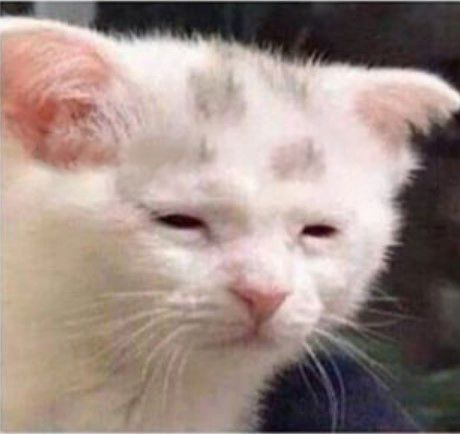
#sung jinwoo x reader#sung jinwoo#solo leveling#jinwoo#solo leveling x reader#sung jinwoo x you#sung jinwoo x y/n#jinwoo sung x reader#jinwoo sung
638 notes
·
View notes
Text
A Round Door Like a Porthole, Lazarus Green Pt. 1 Pt. 2 (you're here) Pt. 3 Pt. 4
Art of LBM
Danny was still lying under the Specter Speeder, mind reeling as the words “they opened this portal with a child sacrifice, and bound his death and all the lost life potential to their bloody machine to create a perpetual gateway to the Infinite Realms” ran in a loop through his head. Could that really be true? Is his death attached to the portal, forever lodged in the doorway, preventing it from closing?
The guy clearly knew what he was talking about. The bit about why his ghost friends and frenemies caused so much chaos as they unleashed their obsessions on Amity Park made so much sense. It would certainly explain a lot of his interactions with ghosts after he died.
Danny silently cursed himself for not destroying everything in the lab before they got here. He and Jazz hadn't worried about the portal schematics, because they honestly didn't have any way to open a portal, only cycle energy in a recursive loop that shouldn’t have done anything. No one, not he and Jazz, not their parents, not Tucker or Technus, had been able to figure out why it had worked when Danny was inside. But if the machine was able to sustain a portal that was already opened. . . He wondered idly if he could light a fire that looked accidental and would both destroy the lab and leave the two men enough time to escape. It’d probably be too risky. And who knew what destroying the portal would do to him. Fully kill him? Destroy him completely and shatter his core? It might be worth it to prevent anyone from gaining this knowledge.
No wonder Lex Luthor was interested in this business. A child was murdered in this basement, and for all Tim knew, the child’s soul could still be trapped here fueling a Lazarus Pit that connected the world of the living to the afterlife. What Luthor could do with an interdimensional portal or even a single sample of Lazarus water. . . Tim shuddered to think.
On the one hand, he was grateful that Wayne Enterprises secured the business before Luthor had the chance. On the other hand, he felt rather ill to think his family had directly enriched mad scientists who performed child sacrifices. At least he had full faith that between him and Oracle, they’d hunt the Fentons down and make sure justice was served.
“What is to be done for the child?” Tim asked Constantine. “Is his soul tied to that machine?”
“I don’t think so. I’m pretty sure it’s just his death.”
“You’re gonna have to explain the difference to me, ‘cause I’m not sure I see the distinction.” Tim said wryly.
“I guess. . . Hm. You could think of it as the moment of transition drawn out endlessly like a plucked string whose note never stops vibrating. Like life is the anchor point of one end of the string, and the afterlife is at the other end, and the child’s death is the note created when his soul crosses from one side to the other. The soul is the bow causing reverberations, but the reverberations are the actual death itself. The effect of the soul’s passage. And in this case, the portal is amplifying the death so it doesn’t end like a normal death ‘note’ would.” Constantine leaned in to examine some of the runes that were part of the array. “Not a perfect metaphor, obviously, since you bow perpendicular rather than parallel to the string, and death and souls are nothing like music, but you get the idea, right?”
Tim was still caught on John Constantine saying the words “death note” together unironically in a sentence. He was going to have to share that with Steph later. Maybe with the whole family group chat, even. “Yeah, the metaphor makes sense, as much as any of this occult stuff does to me.”
“Whatever. As for whether there’s anything we can do for the child, I think we’ll have to try and summon him if we can.” The Brit started pulling items out of his trenchcoat’s inner pockets. “We need to ask what the spirit wants done, before we go messing with things we don’t understand.”
“Alright, need anything from me?”
“Yeah, move this stuff out of the way so I can draw a circle.” Constantine directed Tim to shove aside a few stacks of boxes, something called a Fenton Ghost Weasel, and together they shifted a coffin-shaped iron maiden that for some reason was labeled Fenton Stockades. Then he set to work chalking a circle and runes on the ground.
Finally he sat back and dusted chalk off his hands. “That should do it.”
“Will this be bright too?” Tim asked warily.
“Eh, might be? Shouldn’t be too bad.”
Tim grabbed an auto-darkening welding helmet with a green “Fenton” sticker on it off the workbench and slipped it on.
“Alright, here goes.” Constantine began the summoning ritual.
While Danny debated arson, the other two had finished clearing a space and chalked some kind of circle onto the floor. He tuned back into the conversation when he heard the trenchcoat guy begin a traditional incantation for a summoning. Were they trying to summon him? Danny really hoped it wouldn’t work.
When people tried to summon the Ghost King he could almost always ignore the pull. This pull, however, was very strong and immediate. It seemed proximity made a difference, or this guy was just better at summonings than the average cultist. Before Danny could accept the inevitable, he was pulled bodily — literally! — out from under the vehicle and across the floor, still flat on his back on the Fenton Under Car Creeper, with the Specter Speeder’s ecto-engine hugged tightly to his chest. The wheels of the Fenton Creeper (not to be mistaken with the Fenton Anti-Creep Stick) sped him straight to the summoning circle. Still very much in human form.
This was his first real look at the guy called Constantine, and he couldn’t help a horrified yelp. “Eugh!! What the fuck is wrong with you, dude!?!!”
His lapse in attention made him lose the battle with the summoning spell, and it gripped him, pulling him through the convolutions of the spellwork even though he was already lying half across the circle, and forcing him to change into Phantom in the process. It was such a disgusting sensation, like he was one of those squishy water filled tube snake toys that look like a fleshlight, and someone squeezed really hard and abruptly so he turned inside out and went flying to go splat against a wall (or in this case, against the ground inside the circle of chalk). He tried and failed not to retch.
The younger man in the crisp suit whom he’d already identified as Mr. CEO-Timothy-Drake-Wayne looked at him in startled bafflement, while the older blond, still smoking his cigarette, (gross, and was that thing never ending?) was probably looking at him. Maybe. It was really difficult to tell, because he was a frankly vile sight. Danny winced and swallowed down nausea. “What have you done to your soul?”
“I — what?”
“Trypophobia central, man! Ugh that’s gotta be the grossest thing I’ve ever seen. Can’t you cover it up?”
“Who are you?” Timothy Drake-Wayne interjected.
“I’m the dead guy? You literally just summoned me.”
“Constantine said you were a child”
“I mean, I was?” Danny looked down at his obviously twenty-something year-old self and rubbed the back of his neck. “It’s been a while since I was fourteen though. These things happen.”
“Not typically, no. The dead tend to be pretty unaging.” Constantine said.
“Dude I’m not having a conversation with you while your soul looks like Escher’s swiss cheese nightmare. Anyways, some of us do. Heck, I know a guy who constantly shifts from infant to old man and every stage in between. It’s pretty distracting when you’re trying to get him to let you fix the timeline again.” Danny continued to look anywhere but at the blond man. “But if it’s so important to you, I can —” He got an abstracted look, and slowly de-aged himself until the two men stood over a fourteen year old boy with snow white hair and glowing green eyes.
“That does not help. No.” The guy whose soul looked somewhat like a bleeding tooth fungus said. He turned away and started doing something magical. Danny hoped it would mask his soul in some way, but so far all it did was make Danny feel like he needed to pop his ears.
He also felt particularly uncharitable, so he didn’t revert to his natural age, and instead tried to see how young and cute he could make himself appear.
“So are you just haunting this basement? Seems hazardous, given the former proprietors.” Timothy tried to redirect the conversation. He didn’t seem nearly as distressed to see the ghost of a child, but his eyes darted surreptitiously to the Lichtenberg figure Danny used to always hide under gloves.
“Nah, haven’t been back here in years. I mostly live in my Infinite Realms haunt these days.”
“You . . . live? Is that just a figure of speech?”
“It’s rude to ask about a ghost’s nonliving status, you know. Highly taboo to ask how a ghost died or poke into the circumstances of our deaths without permission.” Danny admonished. Making himself younger than fourteen took more effort than he expected.
“Alright, I’m sorry,” Timothy raised his hands placatingly to the boy who now looked younger than Damian. “What brings you back to Amity Park?”
“Uh, you summoned me? Are we still not clear on that?”
Tim looked pointedly at the Fenton Creeper and the engine Danny still held. He’d shrunk down to the size of a four year old, and the engine really should be crushing him given it was bigger than his torso now. He quickly set it aside, and turned his biggest puppy dog eyes on Tim.
“You were in here already, and you looked pretty alive for a moment there.”
“I can look lots of ways!” Danny focused really hard on looking as cute, small, and nonthreatening as possible. He thought it was working when all of a sudden there was a pop! and he was smaller than he’d ever managed before.
Timothy Drake-Wayne looked like a giant. The other guy, who had thankfully managed to put away his soul somehow, wore scuffed oxfords bigger than Danny. Hell, he could probably fit his entire self into one of Constantine’s shoes if that wasn’t a bizarre thing to do, and they weren’t already full of stinky feet. Holy shit what happened to him!?
Tim blinked down at the cat? Snake? Ghost. . . thing at his feet. What the fuck. A moment ago he was talking to an adult man whom he’s pretty sure was dead and he’s very sure was trolling them. Now his interlocutor had turned into an adorable creature with soft white paws, a long twisting tail, big pointed ears that swiveled like a cats, and a humanoid face that should’ve been creepy but was actually eliciting cute-aggression in him. Tim blinked again. The little baby ghost creature blinked enormous green eyes back at him. Then it yawned, revealing three rows of needle sharp teeth that looked like a cross between what you’d find in the mouth of a shark and a cat. Yikes.
“Does that mean the interview is over?” Tim asked him.
The creature just blinked up at him again, then zeroed in on his shoelaces, pupils expanding until only a narrow band of green ringed them.
Yup. The interview was over. Those paws hid some wicked claws which could apparently slice through leather with ease. Oh, Tim really hoped ghost scratch fever wasn’t a thing. At least the ghost looked sufficiently contrite after he yelped, and it waited while he removed a shoelace to sacrifice as a toy.
If Damian ever met him, there would be a new member of the family. Maybe he should name the creature preemptively so they didn’t have a cat-snake named Bat-Ghost in Wayne manor.
“Do you have a name, little baby cat-snake ghost? Little baby ghost man?” He cooed as the miniature monster dashed back and forth, intent on shredding his shoelace.
The ghost paused long enough to chirp, “Li’l baby man!” before launching himself at the string. Even shocked, Tim’s reflexes had him whisking the toy out of the way, and the ghost went careening under a cabinet.
He wedged himself in the gap, landing face first in a dust bunny, and quickly wriggled backwards with an indignant squall. His wordless protestations cut off as he fell into a violent sneezing fit that thankfully dislodged him from beneath the cabinet.
Tim suppressed his laugh, and asked, “Little Baby Man? Is that what you want to be called?”
The ghost pawed most of the dust away from his nose, but spider webs covered his face and a big dust bunny perched atop his head like a fascinator with a cobweb lace veil. He looked Tim right in the eyes and nodded, dislodging the dust in his hair and setting off more sneezes.
“Li’l Baby Man” he confirmed. He placed a paw on Tim’s shoe and chirped, “Tim!” Then he pointed his tail at Constantine and said, “Gross!” with narrowed eyes.
#danny phantom#danny fenton#dp x dc#dpxdc#dc x dp#timothy drake wayne#tim drake#tim drake wayne#red robin#john constantine#A Round Door Like a Porthole[comma] Lazarus Green#the whole thing is on Ao3#but I'm not gonna link it until I post part 3#just to be contrary#you can find it if you search the title though#and also someone linked it in the comments of part one#lbm#lbm danny#little baby man#lbm is a tatzelwurm#fanfic#dp x dc fanfic
821 notes
·
View notes
Note
I like the fact that the devs agreed and added the parallel that the ancients are all very kind to themselves, even at their worst, how vulnerable they can be. In chapter 10, HB accepts Lily's wrongdoings, and despite the fact that it took her a while to process her trauma, she tries to make peace with her.
Now with the beasts, it's so different because, if you notice, despite having a problem, they don't try to change their ways. That's why most of them don't understand each other; their philosophy clashes greatly. Despite one of them claiming to be very close, in reality, each and every one of them feels so alone. It's undeniable how many people still believe they're close.
It's fascinating to see their parallels. It's good to know they're not close; it's complex and interesting. I want to add about episode 10 i feel outraged by the fact that no one talks about how complex ES's character was the last part of the episode made me cry because i know she only had one purpose when she was created and the fact that HB proposed to her to leave their garden and go with her was the most painful and touched me so much. (seriously my friends asked me if i was okay because i cried a lot LOL) everyone thinks it's an unrequited love, if it wasn't reciprocated HB wouldn't take the time to understand ES and explain to her that the world doesn't have to be perfect like she describes it. it's an episode with a queer tragedy explained in the hardest but sweetest way possible... And the game is from a country that litteraly is a sin to be like this or not good received as well.
All of the BxA r Indeed were pure art but with different narratives as well
Yeah definitely!! I've always loved the parallels between the Beasts and Ancients - not just individually, but as groups. While they both endured equally great suffering, in the end, the Beasts chose the easy way out. They chose darkness and despair. They chose to inflict their suffering onto others instead of properly addressing themselves and their shortcomings. And what's fascinating is that, for a time, the Ancients chose similarly: Golden Cheese succumbed to delusion and hid herself in a fantasy world in order to assuage her grief, Hollyberry abdicated and ran away from her family and her people and her life, drinking and fighting and partying her woes away, Dark Cacao built literal and figurative walls around himself and shut everyone out, Pure Vanilla was an amnesiac for a while, thus technically foregoing truth (albeit not necessarily by choice), then he allowed himself to be a Cookie of Deceit for a while, White Lily... we know what happened to her lol. But they managed to save themselves because they had each other. For each and every one of them, their salvation and enlightenment came when they remembered their bonds with each other and with others they care for. It was that sense of connection and community, which never ever broke despite everything that happened to them. And then opposite to them are the Beasts, who broke apart and descended into villainy because they themselves did not have those connections; not just in reference to them never having had the chance to live as normal people, but in reference to their bonds with each other specifically. I believe now more than ever that they never REALLY cared for each other. That they were never REALLY friends. If they were, why didn't they help each other when they started corrupting? Example, Burning Spice: I believe that what he needed the most was assurance that the cycle of change is not and does not need to be inherently painful or bleak. That there is good and meaning in that endless repetition. What would've helped was him having a constant in his life; someone or something that was always there with him even while everything and everyone else slipped away, as the cycle of change mandates. For all intents and purposes, the other Beasts should have been that constant; they're immortal too. They're gods too. They're his friends. They WERE his friends. Or... were they not? I don't really think so anymore. What the Ancients have together, the Beasts either had a very weak and fragile copy, or never really had at all. IF they were ever friends, they were pretty shitty ones lol. And that's a big part of why they corrupted, and why they're all so bitter and lonely: they each feel as though no one ever understood them or their struggles, not even their supposed "friends". Then these 5 thieves come along and inadvertently give them that lifeline, to which they all react differently (in how they express their attachment, I mean. They're all obsessed but they let it show differently and to different levels), but underneath those differences lies a shared feeling: "oh God, someone finally understands me, someone finally feels what I feel, I can't ever let them go, I need them". It's so horrendously sad and disturbing and darkly fascinating. I love it. I love these pairs, I love talking about them, I can do it forever
And I agree with you that Eternal Sugar is a complex and very interesting character, and I'm disappointed in the people that think otherwise (I hate saying this, but a lot of the complaints kind of sound like they're just butthurt that Eternalberry was canonized and they're looking for any excuse to tear the update down because of it). She seems to be a step above Mystic Flour in that she really, truly thinks she's doing something GOOD (MF behaves this way as well, but ES is legitimately delusional). She actually thinks she's helping people. Deep down, she DOES understand that she's a bad person and she's only hurting those she claims to care for, Hollyberry included, and this dialogue demonstrates such:

She seems to have succumbed to a form of insanity above that of other Beasts; she is still clinging to her old desires to carry out her godly duties and make people happy, but her perception of such has become so warped that she actually thinks things like keeping people in jars forever is making them happy. Furthermore, she purposefully orchestrates situations that "prove" her mindset and ideals correct (allowing people to leave the garden if they wish ("see? I'm not controlling! I'm not desperate! I'm not a dictator! You can leave, it's ok!"), but having them leave while smelling like the perfume that permeates the whole area so Beast-Yeast monsters are drawn to and attack them, thus forcing them back into the garden and further convincing them that it's a safe haven and they belong there). So much confirmation bias with Sugar, it's crazy. SHE is crazy. She is LEGITIMATELY crazy, a sort of crazy that the others aren't, not even Shadow Milk. It is delightfully awful. She is delightfully awful
And oh... Holly... Holly and Sugar... Passion and Sloth... Them...






One begs the other to stay... The other begs them to wake up and leave. Holly is now the second Ancient to fully, directly express understanding and sympathy towards their Beast. She's now the second to fully, directly state that she wants to be with their Beast.


She's HAPPY at the prospect of them being together. Of being two halves of a soul. She would GLADLY complete Sugar and let Sugar complete her... but Sugar has to wake up first. She has to see the error of her ways. She has to leave her garden. And Sugar agrees to this. She probably didn't really mean it, she was probably just swept up in the Yuri Wave and saying what she thought Holly wanted her to say, but even so. I think it's meaningful. Out of all the Beasts, I think Sugar has the best shot of being redeemed. And she has just the right Ancient to help her with such a thing. (Tbh I think they can all be fixed. Not easily, not right away, absolutely not. It would take time and effort and a lot of very painful conversations and realizations on everyone's part. But I think it can be done. Each of them has shown that one little seed of doubt, of regret, of disillusionment. Each one of them has faltered, if only for a moment. Because of that, I think somewhere deep down inside of them is someone worth saving. But that's just me haha) Beast x Ancient is 5 different, delicious flavors of a beautiful and compelling tragedy and they kill and resurrect me several times a day
#i still can't believe Holly hit her with the “not right now baby i want you to go to therapy first. Then we can kiss. ok?”#i can't believe gay women are real u guise#and yeah you're right about this being especially poignant due to the country this game comes from#South Korea is not as bad as the Middle East or Africa but they still don't think highly of the LGBT at all#it's actually kind of special. the things they show in these games. because a lot of it is not accepted in Korean society#i feel like that notion is lost on most Western fans. tbh I think most of them forget that this is a Korean game period lol#but yeah I GET YOU ANON 🫵 I'm picking up what you're putting down here#also ofc it's requited love lol it is for all 5 of these duos#Holly understands Sugar not just because they're literal soulmates but because she HAD TO in order to win#all the Ancients had to grasp their connection with their Beasts and why they're the way they are in order to beat them#there was no other way. it was Get Intimate On a Spiritual Level or Perish lol#anyway YAY PRETTY PINK TOXIC YURI YAY BEAST X ANCIENT YAY WE WIN WE WIN WE WIN#cookie run kingdom#hollyberry cookie#eternal sugar cookie#hollysugar#eternalberry#crk update#merchant asks
184 notes
·
View notes
Text
Visual Parallels: The Full Moon and Mastermind
It's mad scientist mode time ya'll.
The visual references to other episodes in Mastermind are wild. People have already beautifully pointed out how the duet sequence references Blitz's "Truth Seekers" hallucination and "Just Look My Way," and makes the two inner worlds mesh.
"The Full Moon" is also heavily referenced. I first noticed it in this shot of Stolas . . .
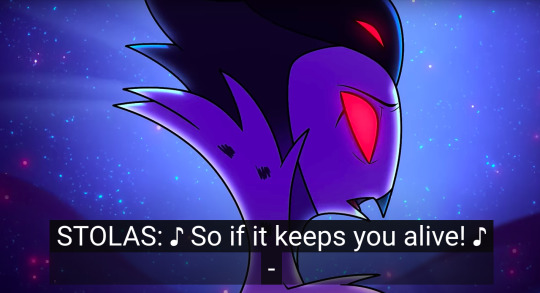
Which is repeated quite similarly a few times in the trial scene, and looks a lot like . . .
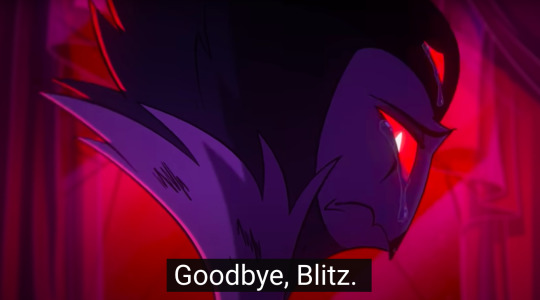
The camera angle (if there were a camera) is pretty much identical.
This made me realize that the whole sequence (the duet and Blitz getting pulled away afterward) has them positioned with Blitz facing Stolas and Stolas's back to Blitz, with a similar distance between them to what we see in "The Full Moon."
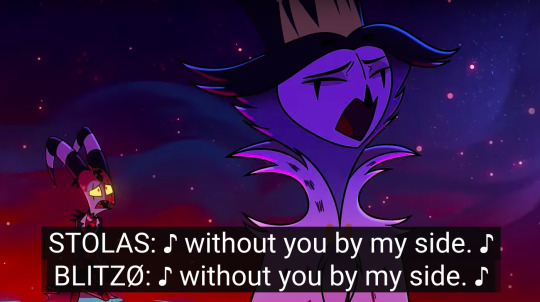

And as I rewatched both, I saw more and more.
An attempt by Blitz to touch Stolas, and Stolas not turning around, having already decided his course of action.
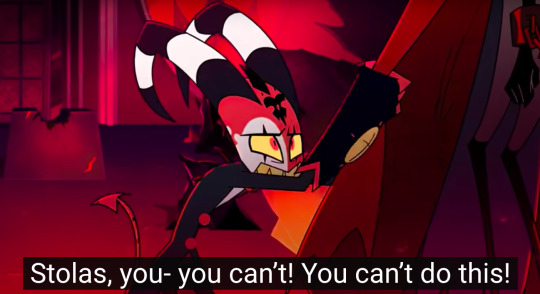
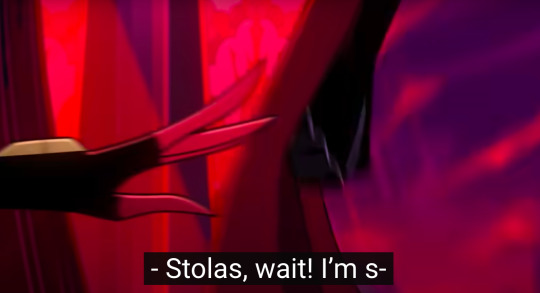
(Is anyone noticing a similar color palate yet?)
And a forced exit, based on a decision that Stolas makes:


So this very well might show that Stolas is holding a lot of the power in their relationship. But also, the similar elements in these scenes aren't identical- they simply rhyme.
There are some interesting differences with Blitz's physical expressions of desperation. Even though he's set away from Stolas against a bright red background when he's expressing himself in both.
In "The Full Moon," well . . .


He's guarded. His hands spend a lot of their time in fists. He's moving toward Stolas but not giving all of himself until it's too late.
But in "Mastermind . . .
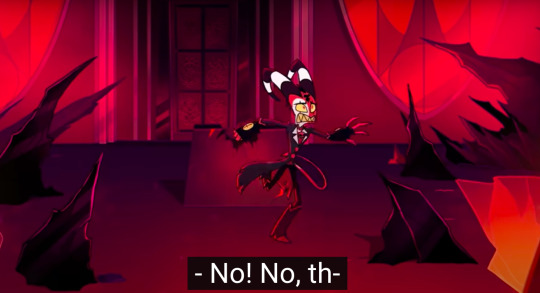
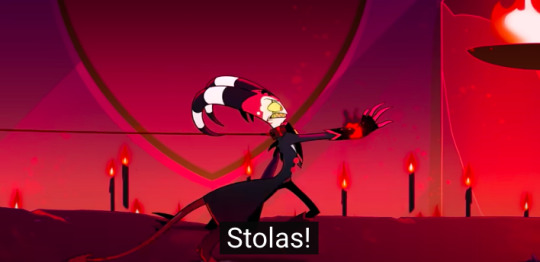

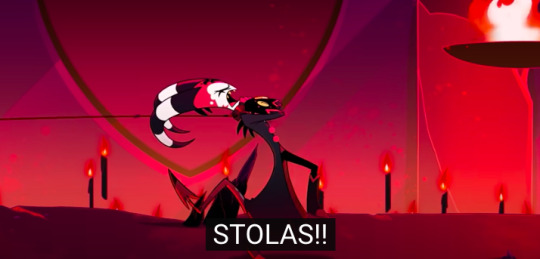
It's like he's drawn by a magnet to Stolas while being forcibly pulled away. He's fighting the forces that would keep them apart, that would harm Stolas. He's fighting with everything he has. His hands are open the whole time he's fighting. The walls are gone.
Doors are also interesting in their contrast.
In "The Full Moon," we see Blitz bursting into the room like this:
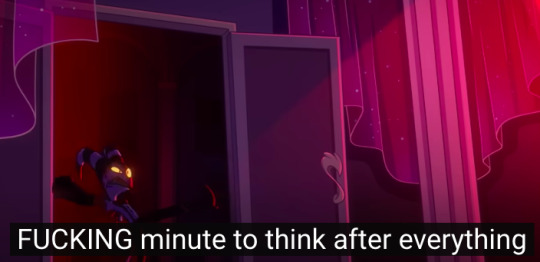
In "Mastermind," the door behind Stolas serves as Blitz's exit point, but the camera angle, again, is very similar . . .
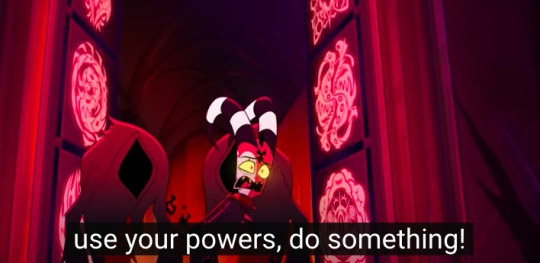
I don't know what to make of this one, honestly, except that these moments seem to reverse each other. I think there COULD be symbolism here (barriers and who creates them), but I'm not sure there's enough evidence that it's intentional like the others.
Now for a few key things "Mastermind" has that "The Full Moon" needed. Our boys weren't ready yet, but now they are.
Obviously the duet . . . but did you notice that their movements synchronize too? They're not looking at each other, but literally and figuratively, they're in tune.

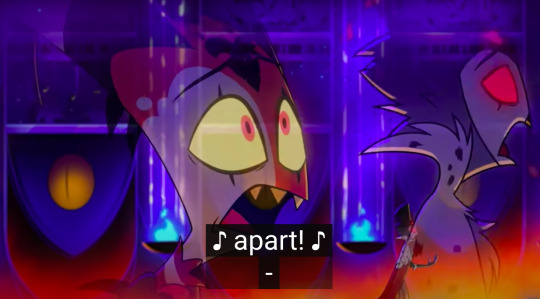
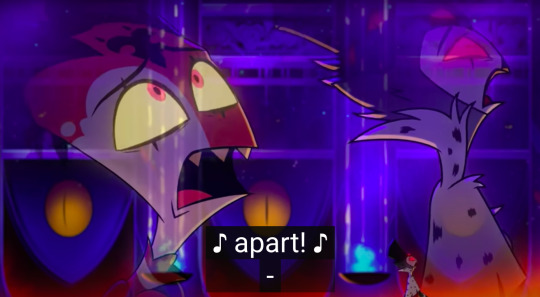
2. Eye contact. FUCKING EYE CONTACT. It's so brief you could miss it.

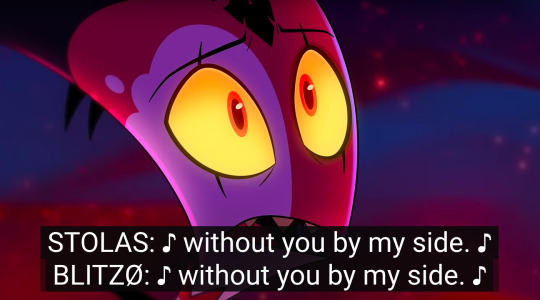
There's recognition there. They each see that the other feels the same way.
Even though Stolas never turns around, and still has A LOT to learn about Blitz, they meet at the core of the matter. "Harriet, don't get on that train. It's going to London, and I CANNOT BE WITHOUT YOU."
#the process of writing this was intense#goes into the fetal position on the couch and stays there#I'd love to hear what you all think about these parallels though#stoltz#stolas#blitz#stolas goetia#blitzo buckzo#blitzo#helluva boss#my helluva meta#helluva boss meta#helluva boss mastermind#helluva boss the full moon#the full moon#mastermind#mastermind spoilers#helluva boss spoilers
336 notes
·
View notes
Text
Anyone want to hear my idea for a Relativity Falls Au that's been haunting the back of my brain for a few weeks?
So there isn't a one to one copy paste for the Mystery twins and Stan twins. Each of them parallel each member of the other set in different ways. Stan and Dipper have similar paranoid personalities, Ford and Dipper interests, Stan and Mabel share creative imaginative sides, while Ford and Mabel have similar trusting and whimsical personalities. My biggest thing with most relativity au's is that i don't see Bill being able to trick Dipper long enough to create a portal without him getting sus similar to Fiddleford, and i don't see Mabel catching Bill's attention the same way as Ford, as she's not intellectually driven and so wouldn't really want to build a portal into another dimension.
So here's my idea.
Stan and Dipper switch places, Ford and Mabel switch. Dippers stolen his sister's identity in order to keep her house and rescue her, while Mabel's stuck, but not because of Bill.
But because the other swap i'd do is Bill and Jeff.
Instead of a demon giving Ford ideas about grand portal ideas and how he'd change the world, its Jeff, a higher being seducing Mabel in a fairy tale romance, separated only by the veil that divides the human and fae (or magic or something). Oh! If only this veil wasn't between them, then Jeff could come and sweep her off her feet and take her to his castle, where she'd become queen of the fairy's.
This, of course, is a lie. Or somewhat of one. Jeff the (still) gnome (if a lot more powerful), along with all his gnome brethren and their mighty gnome army, are trapped in the fae realm. He wants to tear down the veil between worlds, clash the hyper magical fae one with the more mundane one, and take over the planet. Then maybe expand upwards, he's open to it. Unfortunately to do so he needs someone on the mundane side to open the way, and the way to create that opening needs ingredients from so many kinds of creatures that need to be willingly given, its a near impossible feat.
Enter Mabel. She's charming, whimsical, and trustworthy. She makes friends with all types, and is very lovable. The perfect pawn to use to befriend and get the ingredients, open the arch (instead of portal, to keep with the more magical theme instead of sci fi), and let him and his army through. She summons him somehow, and he uses a disguise similar to canon (if more put together and believable) to make her believe he's a fairy king. He sees her lovable and trusting nature, as well as her highly skilled craft work, and figures he can use her to open the way, then as a reward he'll marry her and make her the queen of the gnomes in their new kingdom.
Mabels scrapbooks (instead of journals) aren't her cataloging anomalies, they're her gossip/friendship books, that she used to keep track of all her many friends relationships, likes, dislikes, and whereabouts. Instead of Dipper trying to learn secret codes, its him trying to figure out Mabels vague comment on getting 'sparkles' from someone named 'chuck', so he needs to both figure out who chuck is, and what on earth she meant by sparkles, then get chuck to give him the sparkles (Chucks a mermaid, sparkles are his tears or something, you get what i mean). He needs the other journals both for the rest of the ingredients, and to figure out who is who and where to find them. Instead of learning high level physics, he learns all kinds of crafts to both put the arch together, and convince each magical creature he's mabel, putting his charms to the test each time.
Still not sure how Dipper and Mabel would have their falling out or how she'd get shoved into her own creation, but instead of being the multiverse, it'd be something similar to Mabel land, where she's battling all these whimsical creatures, trying to find out how to defeat Jeff and his gnome army using magic.
Thirty years later, the Stan twins arrive. Stan takes Dipper's place, in that he finds the journal and keeps it, but not because its full of mysteries, but 'hot babes'. His goal here with the journal is to find the author, not to solve a mystery, but because he wants to learn how to be as social and charming as they are. They had so many friends and people who like them, and Stan wants to learn their secrets because he doesnt have anything going for him except his fists and his personality. Ford, on the other hand, thinks is a prank book of some kind, until Stan uses the entry on the 'little shape guys' to figure out that Bill was not a scouter for some advanced summer camp/school, but a shape guy who wanted to kidnap Ford and use his intelligence to plan out petty schemes of some kind. Not sure on the specifics there, but Bill and all the second dimension inhabitants take the place of gnomes here. All the henchmaniacs switch places with the anomalies Dipper and Mabel fought/befriended, and they become regular Gravity Falls residents while the residents become generals in Jeffs gnome army.
Anyway thats all I got, just wanted to write it out somewhere to get it out of my brain.
#gravity falls#gravity falls au#relativity falls#saw a thing comparing jeff and bill that inspired it#just made sense to me#so mabel comes back as a witch or something#instead of a sci fi gunslinger like ford#just as badass#just in a different flavor
133 notes
·
View notes
Text
no no i'm actually not done with timebomb/jayvik parallels. bear with me for a minute
the contrast between the everybody lives timeline ekko and heimerdinger ended up in and jayce's post-apocalyptic wasteland timeline is pretty funny indeed, but i love that juxtaposition because these practically opposite realities serve the same purpose for ekko and jayce. they solidify their goals and, by extension, their willingness to save the person they love.
ekko gets to see the world where his community is thriving; where his childhood friend/crush is loved and happy and enjoys her life in ways the version he knew couldn't. but he learns that this powder is not a complete stranger. this powder is just as talented as jinx, just as brilliant and quirky and so familiar despite all the differences. it has to mean that in his timeline, the girl he knew is still here. she was always there. nothing that has happened to her during these years managed to kill her. ekko would never left his people behind, but he also won't leave jinx: he's the only one who gets through to her and convinces her to do the right thing, even though she might think there's no way for her to be a good person whose life is worth something. ekko doesn't simply believes it's not true. he knows it for a fact.
jayce gets to see the world where viktor won; there's nothing besides corruption, abominations and death, and that's the fate that awaits jayce's timeline if he doesn't succeed. viktor caused all of this, but he's also the one that leads him to the top of piltover. he's the one who gives him a key to salvation, and it is as simple as it is intricate: it's jayce himself. this viktor is a lonely god trapped in a perfect hell he created and it took him ages to realize his mistake — and he believes jayce is the only person who can stop him before it's too late. in all outcomes, it's him. it is as much as a statement of a cosmic powerful being as a belief of a dear friend. jayce is not even certain there's something left of viktor in his timeline, but he has to be. he won't fail. it's a promise he keeps.
it is about saving the world, but also about saving someone very dear to you. someone who is so lost in their own faults and mistakes they forgot they're not beyond salvation, but they don't know you won't save the world without saving them
#oh the boy saviour and & the only person who can show viktor the way. you both will always be famous#still haven't processed the finale i have so many feelings about all of this!!!!! pretty much insane#timebomb#jayvik#arcane#arcane s2 spoilers#arcane spoilers
345 notes
·
View notes
Text
Narry parallels the voices and the vessels cause technically speaking, he is a smaller piece of someone else. Much like how the voices and vessels are pieces of two bigger gods.
The difference between the Narrys and the voices/vessels is that since the main body/who Narry once was is gone, he can no longer change and have new perspectives added into the “main” body.
And thinking about this, the line between manhood and godhood is like. Really thin in STP. Cause technically speaking, Narry is the god of the construct, since he was the one who had created the place. Quiet and the Princess/Shifty parallels Adam and Eve in that regard, with them being the first man and woman in the world Narry had created for them. Narry had given the two previously unconscious beings a life. And he did all of that while he himself is still just a mere mortal. Not to mention that Narry appears to be the least human out of the three main characters due to his literal inability to change due to his own nature as an Echo.
And then there’s Quiet and Shifty, two gods created by the mortal man, are the two that we usually sympathise and connect with as humans. Despite them being gods, they are very human. One embraces his humanity, while the other denies her humanity. But in the end, despite not being able to fully experience what’s it like to be a person, Quiet and the Princesses/Shifty, before the reveal, believed that they’re mortals.
The debate of whether the voices and the vessels are their own person or not is ever lasting. Are they mere small parts of something much bigger? Or are they their own person? Have they also been gifted the gift of free will? Are they alive? Should they live?
Do you think Narry tries to not think about the fact that he’s no longer human? And tires to deny it as much as he could? That a part of him still believes that he is still a person?
#more rambles from meeeeeee#slay the princess#black tabby games#stp#slay the princess insight#stp the narrator#stp narrator#stp shifting mound#stp the long quiet#stp voices#stp vessels
70 notes
·
View notes
Text
Landduo is just living rent free in my brain cause where else do you find two immortals who have spent at least three worlds together and they still manage to ramp up their chaotic relationship and this time successfully drag many people into their divorce?
For a bit of context I have followed this duo for quite a while, Foolish was one of the first people I watched regularly from the DSMP after I discovered Techno because Foolish was building the DreamXD statue at the time and I was curious about the server. I didn't see the prior pranks but I do have clear memories of watching Bad add different faces to the statue and building the giant cactus monstrosity in the middle of Foolish's summer home.
My Roman Empire was that fucking stream where Foolish dismantled the entirety of Bad's home and moved it to the new world, it took him several hours and I never found the VOD again [if anyone has it please drop it in the replies, I want to rewatch it].
Like these two have been weird about each other for YEARS lol.
Then we went from DSMP to the QSMP where they only reinforced their dynamic is one not even they know but it screams immortal energy without them even feeding into it too much lore-wise. Because between the threats of bodily harm and banter, they trusted each other with their kids implicitly. Not a single question about if the other would break it, simply they knew they could be sure the other would care for their most precious family members.
Because on some level, they see one another as family. They would never admit it out loud, the moments they show such are as rare as the compliments they pay one another. But they know no matter the world they share, the other isn't far away. The universe delights in placing them together, in spite of everything.
They are rivals. They are confidants. They hate each other. They'd kill anyone else who disrespects the other. Only Bad can kill Foolish. Only Foolish can die to Bad.
Death hungers to feast on Life, and Life willingly gives in each time hoping to hold back the destruction Death can wrought if left unchecked.
The Realm is a culmination of who they are. They dragged everyone into their thousandth divorce, showing parts of their personality they rarely do for the sake of unsettling each other and the mortals they find themselves surrounded by. The factions were always a plan but they were apparently moved ahead [I think I remember Tubbo saying this but take that with a grain of salt] because Foolish rocked up day 1 and declared himself King. Which, predictably, Bad did not like and immediately created an opposition to the faction his rival formed.
But they mirror each other unconsciously; Bad declared Foolish a tyrant and became one himself. Foolish states Bad's heart beats with both kindness and chaos but what was last nights one versus one if not impulsive chaos? After an extensive talk about how the PVP on that server is unsustainable and not quite balanced properly, geared more towards leveling than fighting each other specifically.
They are driving me INSANE man, like I keep seeing parallels and differences everywhere I look, which includes characters like the one Tubbo plays where he feeds into their chaos.
Creation [Tubbo] is encouraging Death to ravage the server and attempt to force everyone to under his rule, Life willing to sacrifice himself to satiate the bloodlust for just a bit longer and perhaps give them a few more moments to think.
Its poetic. It's disorder incarnate. Its the natural cycle of life and death personified.
It's Bad and Foolish, arguing again for the thousandth time but this world is one they have gotten the whole server involved and I agree with Foolish's points last night of yellow and green will never peacefully coexist and at the end of it who will remain standing?
I, for one, don't think its the mortals that have earned their protection. I think it will be the immortals who are treating this world like a playground until there is no sanity or reason left, something to match their dynamic that will forever rage onwards cause that's their form of affection and companionship.
And where else do you find a dynamic like theirs? We don't understand it and neither do they, and that's what makes it all the more fascinating, entertaining, and irritating in the best way.
108 notes
·
View notes
Text
Rewind 2024 - Part III

WangxianFicRecs - Rewind 2024
Part three of our favourite stories published in 2024. If you also want to give a shout-out to a story, submit an ask and we will share it in an upcoming post featuring Follower Recs and Proud Author Spotlights.
~*~
Shoot Down the Sun
by phabulousphantom
E, 74k, Wangxian | Kay's Rec
Summary: The Yiling Patriarch was felled on the Langya Front. The world to which he returns is very different from the one he left behind. This, in no small part, because he now inhabits the body of an omega.
~*~
the future haunts the past
by sysrae (@fozmeadows)
G, <1k, Wangxian | Kay's Rec
Summary: in which feelings about the parallels between Wei Wuxian and Madam Lan produced a poetry-adjacent chatfic
~*~
Bloom for you
by wngxnic
M, 19k, Wangxian | Kay's Rec
Summary: “How long?” Wei Wuxian asks, controlling the urge to cough up another set of flowers. “We can get rid of—” “How long do I have, Wen Qing?” He asks again, his throat clogging with the petals that are threatening to spill. “3 weeks” Love is a kaleidoscope of emotions. It brings hope, joy, pain, and sometimes it drives you to a slow, painful death until you bleed dry and cough flowers for the one you love or a fic where wei wuxian has the hanahaki disease
~*~
You'll Be The Saddest Part Of Me
by YilingSani (@YilingSani)
G, 8k, Wangxian | Kay's Rec
Summary: Five years later, the world had moved on. But not Lan Zhan. He carried his grief quietly. Privately. This little grief was all he had left from Wei Ying. If he let it go, then the memory of Wei Ying would eventually fade away. He would forget that face, that laughter. So, Lan Zhan held on to his grief as tightly as possible. And as the years went on, he realised that what he lost wasn't just his friend or his love. He had lost his soulmate. A wound as such would never heal.
~*~
light is what we create
by lanhualaozu
T, 3k, Wangxian | Kay's Rec
Summary: “Have you ever wondered what it feels like to exchange qi with someone?” It had honestly been a rather innocent question, a simple half-formed musing of Wei Ying’s. It wasn’t until Lan Zhan stiffened across from him, going so much more still than his usual calm immobility, that Wei Ying’s brain began to pay a bit more attention. And then Wei Ying’s face promptly went up in flames.
~*~
🔒 Oh Neighbour Of Mine
by Hidenka_chan101 (@hidenkac)
M, 9k, Wangxian | Kay's Rec
Summary: Neighbours Lan Wangji and Wei Wuxian, live next door to each other and a hard, opaque plexiglass-type barrier separates their balconies. One morning, as Lan Wangji lays down his yoga mat for some early morning yoga, he spies a pair of panties that had crossed onto his side of the balcony.
~*~
HOT TO GO!
by sassybluee (@sassybluee)
E, 7k, Wangxian | Kay's Rec
Part of MDZS Reverse Big Bang: 2024
Summary: Ever since rooming together in university, Lan Zhan and Wei Ying have share an interest in the popular webnovel Modao Zushi. While Lan Zhan doesn't actively participate in fandom, Wei Ying is a popular cosplayer and online personality. Over the years, Lan Zhan has helped Wei Ying with his various cosplays and social media posts. Despite working so closely together, Lan Zhan has never asked for Wei Ying's fandom username, and Wei Ying has never given it to him. He's never seen everything Wei Ying posts on his accounts. Until he stumbles upon Wei Ying's "after dark" cosplay page...
~*~
💙 stray cat strut
by ScarlettStorm (@scarlettohairdye)
E, 54k, Wangxian | Kay's Rec
Part of MDZS Reverse Big Bang: 2024
Summary: Lan Wangji lifts his head to press his lips to Xiao-Hei's forehead, the kiss an expression of all the affection he has to offer. “Prrt?” Xiao-Hei says, and stretches, and— The weight on Lan Wangji increases abruptly, and his hands aren't touching soft fur anymore, they're touching soft skin—bare skin—and he's looking down into Xiao-Hei's yellow, slitted eyes, though not into Xiao-Hei's little cat face, but the face of a man. A beautiful, startled, very naked man. Or: Lan Wangji finds himself with a stray cat he didn't want, then a stray cultivator he pretends not to want, and then a stray boyfriend he definitely wants.
~*~
Roadside Attractions
by Bodldops (@neverwalka1one)
T, 10k, Wangxian | Kay's Rec
Summary: According to Lan Wangji, Yiling has two main items of interest. First, there is a supposedly demonic cultivator who a) may not exist and b) if he does, is keeping the town remarkably safe and not demonic. Secondly, there is Wei Ying, a man he is falling in love with. These are definitely two separate things.
~*~
Good Fortune Lies Within Bad
by ereshai (@ereshai)
T, 1k, Wangxian | Kay's Rec
Part of the MDZS Kidfic Exchange
Summary: Whatever had happened must have been recent - the child, who they had discovered crying all alone outside the house, was scared and probably hungry, but otherwise unhurt.
~*~
tiny gentians
by humancorn (@humancorn)
G, 1k, Wangxian | Kay's Rec
Summary: Lan Wangji scolds five year old Wei Wuxian and deals with the consequences.
~*~
An Unscheduled Stream
by trippednfell (@trippednfell)
M, WIP, 71k, Wangxian | Kay's Rec
Summary: A viral video sweeps through the internet, which appears to show the 1st disciple of Yunmeng Jiang take on a full nest of evil beings in an attempt to protect five juniors from his sect. The unscheduled livestream captures everyone's attention, but there has to be more there than meets the eye. The Lan assign their own 1st disciple, Lan Wangji, to investigate. That investigation will take him years into the future and miles away from Gusu as he seeks to find the truth. When he does find it, it has a far greater impact on his life than he could ever imagine.
~*~
(一日三秋) One day (seems like) three autumns
by SpicyRamen_10969 (@yllzchair)
M, WIP, 47k, Wangxian | Kay's Rec
Part of the MDZS Big Bang 2024
Summary: 13 Years ago, Wei Ying disappeared. 13 years later, two teenage boys find a man collapsed and bleeding on the side of the road. This is the story of how Wei Ying finds himself going from homeless to living with his childhood best friend, Lan Wangji, and finally getting the help and love he needs and deserves.
~*~
so i cut the shackles and changed my name
by MichelleFeather
G, WIP, 34k, Wangxian | Kay's Rec
Summary: “A-Ying, should anything happen, should you be separated from us or find yourself in need of help, find Lan Qiren in Cloud Recesses. No matter what’s happened, he will keep you safe. He has sworn to me his home will always be open to you, no matter what.” Following the advice of his late mother, Wei Ying runs away from Lotus Pier, knowing that if he were to stay, he would likely die at the hands of Madam Yu. And, he finds, the Lan Clan is the place where he was always supposed to be.
~*~
The Sun is back
by Shanashe
G, WIP, 3k, Wangxian | Kay's Rec
Summary: Wen Ruohan's soul is attached to Wei Wuxian after his death. He lingers and witnesses all the canon events that follows. Post Canon, he gets sent back to the past.
~*~
Wei Wuxian's Delightful Demon Baby!
by CheekyBrunette
T, 22k, Wangxian | Mojo's Rec
Summary:The house was very small, only two rooms, and it was largely empty aside from some sparse pieces of furniture. Even the sleeping mat seemed to have been rolled up and carried away. There were a few left behind items that proved they’d found the right cottage, such as a birthing stool and a pile of blankets. Zizhen poked his head to look in a bassinet and screamed. Jin Ling drew his sword. Jingyi gasped and clutched his heart, terribly startled. Sizhui rushed over, hand on the hilt of his sword just in case. “Oh,” he said. Wei Wuxian poked his head over. “Oh!” he said delightedly. Wei Wuxian finds a demon baby during a nighthunt and is immediately smitten with it. Meanwhile, Lan Sizhui is very anxious to solve the case so he can get ahold of himself. (He's never been jealous of someone before, much less a baby, but... maybe this is what it feels like.)
~*~
(Please REBLOG as a signal boost for these hard-working authors if you like – or think others might like – these stories.)
#wangxian fic rec#wangxianficrecs#rewind 2024#the untamed#wangxian#fandom event#long post#Kay's Rec#Kay's Favorite#The Grandmaster of Demonic Cultivation#MDZS#Mo Dao Zu Shi#December 2024#Mojo's Rec
124 notes
·
View notes
Text




Series Summary: For nearly two years, Harry has been fighting to keep his relationship with Olivia afloat. At what point does he make the choice to either endure or let the strain of the world defeat his ambitious hopes of a lasting relationship? Or will a single night and a fleeting encounter be enough to change the projection of Harry’s path? Maybe our ‘Mystery Girl,’ Shiloh, will happen to be in the right place at the right time.
Word Count: 2K
Warning: SLOW-BURNER, Strong language, minor angst, eventual smut, emotional.



I don’t usually think of how my relationships will end, but I’ve been thinking about our ending. The consequence of our beginning has been looming over our heads as if it were a pleading prayer whispered into the night.
When “I love you” no longer sufficed to fill the emptiness that stretched between us, and how fickle we were. Desperate as we continued seeking tiny moments, anxious to close the gap—A revolving door of new faces and places where we lay tucked away, pressing our bodies together like puzzle pieces, hoping that one day they would fit together.
Indefinitely.
But I’m still waiting.
Surely, we knew this wasn’t going to work, right? From the beginning, we’ve been on two different parallels, trying to make this work, trying to force a path through murky water when neither one of us knew when or how the tide would roll in—and here I am, miserable out of my fucking mind. In a shit headspace just waiting for this evening to end because there’s nothing worse than getting into a massive blowout right before an event. I can’t figure out what’s worse, the fight or the forced niceties. The last place I wanted to be was in public, but this is my life.
Olivia was on about something—actually, I don’t even remember what the fight was about this time, and that’s what it’s been lately. These bullshit fights about petty, senseless matters that take more energy to create than they do to fix. It’s just that she’s gotten so jealous and paranoid that I’m growing distant, Olivia thinks she’s the only one fighting to be in this relationship, and maybe she’s right.
—Side note: Before tonight, I really hadn’t been interested in anyone. Honest to god, I was truly in this wholeheartedly.
Anyone who knows me knows I’m constantly in the public eye, even if I think I’m lying low. There’s always a chance that someone will recognize me. The chances of someone taking a picture are even greater because everyone needs proof, or it didn’t happen, right? I personally don’t believe in this, but to each their own. If you know me and who I am, that’s precisely what you get. She knew this when we met, yet she insists that every move I make is for the world, like I can’t comprehend all of the sacrifices that she has made to be with me. Trust me, I know, and as of late, she’s taken every opportunity to throw the list back in my face.
In all honesty, I know that relationships take work, but isn’t there supposed to be balance? Somewhere along the way, we’ve lost that. We both jumped in feet first, and now life seems to be catching up even faster—the constant push and pull in every direction is getting old. Everyone wants something, and she wants the most. It’s like she doesn’t understand the sacrifices that I’ve made. It’s not easy being the world’s biggest pop star and falling in love, but I felt she was worth it at the time.
And now she wants more—Roots that I can’t seem to give her. It’s like I’ve only just begun to find my own footing, stepping into the skin that finally feels right, that’s mine, and she wants nothing to do with it—She wants the control. She wants me to align with whatever she thinks our life should be.
I mean, I get it.
I understand wanting the security of always knowing your next move or having a better grasp, but surely Olivia knew what she was getting herself into. It can’t be this big surprise that our life together isn’t panning out into what she had imagined, and the shittiest part about it is that I don’t even want to try anymore. I don’t want the things that Olivia is trying to project onto me with every fight that ends with her begging me to choose her.
Is that not what I’ve been doing this whole time?
I’m lost in thought when Olivia whispers something into my ear. She had gone on and on about this Gucci Cruise show and was pissed when I decided I didn’t want to sit front row. I didn’t want to distract from the show or draw unwanted attention. Especially after that fight—God, that stupid fucking fight that left her in tears, her makeup a wet smear all over her face, almost making us late.
Tonight was supposed to be memorable. How many people get the chance to attend a Gucci show? This was my first. It’s an honor that I wanted to appreciate and take in with the gratitude I feel not only for the brand but also for the friends I’ve grown quite close to.
“I just feel like the whole point of coming to a fashion show is to sit in with the audience and have a genuine experience of the clothes and the people—” Her comment is pointed and sets me off, so I do the asshole thing and walk toward someone I know leaving her alone with her underhanded comment.
Eventually, I walk over to the edge of the curtain, peering out into the crowd, trying to pinpoint faces I’ll see later, making a list of people I’ll want to see or possibly avoid. As I skim the front row, my eyes land on a woman who looks vaguely familiar. Still, I can’t put a finger on it.
She sticks out like a sore thumb. For instance, she is one of the few wearing dark sunglasses in a dimly lit room. Making her stand out in all black, except for the few accents that set her apart from everyone else around her, who are dripping with vibrant colors—something you would expect at a Gucci show, wild statement pieces, different patterns, and textures that ebb and flow amongst each other.
She was magnetic in a way that made it hard for me to look away. The light seemed to play off her features, creating a soft aura. A delicate ray of pink traced a faint glow around her. I couldn’t tell if it was an illusion or a trick of the mind in my rose-colored glasses. When I lowered my frames to get a clearer view, I found that she was just as stunning without them—and still, to this day, I can’t explain the feeling; it was like my soul took the lead, reaching out, hoping to find a tether. A single piece of thread that could tie me to her.
And there I stood, my mind spinning out of control.
I don’t even know how long I stood there. How long I continued watching her, captivated by how the light seemed to dance with the shadows every time a model passed in front of her. Another thing I noticed was her ruby-red lips. How they spread into a shy smile, the light catching the gleam of her white teeth—a sight I imagined could be seen from anywhere in the room if you were fortunate enough to catch it. I observed her as she straightened upright and crossed her legs, almost as if she had suddenly become aware of her surroundings.
Was she nervous?
Her hair was slicked back into a sleek bun, tight against her scalp, making her features more pronounced, giving her a tidier appearance than everyone else. This timeless look could set anyone apart from the crowd, but what really caught my eye was the gilded chain dress that hugged her all-black attire underneath. I wanted to see her stand up. I wanted to know how the light played off the delicate beads draped from the woven metal. I wondered if it was uncomfortable for her or if she realized she stood out more than the celebrities around her. She had to be someone important, right? Not just anyone can sit front row at a Gucci show
Who is she?
As if she sensed my gaze, her head abruptly turned toward the curtains, causing me to jump back and bump into Olivia. “What the hell?” I hissed.
Olivia stepped back, eyes wide, my words landing with a bite. I thought, “fuck is she about to make a scene?”—and yes, the bitterness was unnecessary, but it came more from defense than anger. I didn’t want to be found out. What was I doing anyway? How long had she been standing there? Could she see what I was looking at? Or could I pretend that I was trying to get a better view of the show, which was technically true, right?
“Can we please start over tonight?” she asks, almost pleading. “I know tonight is special for you.” And then Olivia is running her hands up my chest and cups my face.
“Okay…” I exhale. I want to have a good time, but a part of me knows I would enjoy myself more without her here, and it’s this very feeling that will haunt me all night, my thoughts like demons filling the room—unwanted guests that I’m no longer sure I want to keep at bay, and I know this isn’t fair.

I couldn’t tell if it was the afterparty or the drinks that came with it, but eventually, the mind fog that plagued me throughout the evening began to lift. It was like a breath of fresh air, each drink diluting the pressure; the animosity threaded into every conversation Olivia and I had was evaporating. I could let go of the stress and relax into the theme of the night—and that was to have fun and fucking enjoy myself because I work hard, dammit.
It was getting easier to play into Olivia’s game of putting on for the crowd. This was the part she liked; she loved putting on in a room full of people. She fucking thrived on the attention—she loved wearing me like a glove she could take on and off whenever she pleased.
And at times, I allowed it.
I was already three drinks in when I spotted my “Mystery Girl.” It surprised me—she was much shorter than I had imagined, but there was something compelling about her presence. When she finally looked my way, I instinctively put my arm around Olivia, feeding into the lie, feeling like a fool when her eyes flitted over me with no recognition, piercing my ego in one swift look. I didn’t know what I thought would happen…actually, I’ll tell you exactly what I thought would happen. I thought my presence alone would be enough to garner her attention. Instead, I stood there stunned when her eyes lingered on Olivia, sending her a friendly smile as she mouthed the words, “I love your dress,” pulling at the strap of her own dress to drive her compliment home.
Astonished, I stood by, holding my breath as the transaction morphed into Olivia mouthing a returned compliment, making ‘Mystery Girl’ beam and my chest swell with jealousy as she turned away, not even sparing me a second glance. She moved through the room effortlessly, like a hummingbird, moving from flower to flower fast yet graceful, donning that beautiful smile that had me begging her to look my way—just one more time. That’s all I would need.
Was she a journalist?
It seemed like everyone knew who she was. She spoke to everyone she encountered with such ease that each conversation I noticed flowed as if they were friends, though perhaps they were, but how was I to know? At some point, I lost her in the night, or maybe I knew I had to release her from my thoughts. I wanted to end the night on a high note, not go home with a suspicious partner to whom I would have to explain myself later.
So, by drink five, I was being pulled onto the stage with Stevie, duetting a few songs, and as I closed my eyes, singing out the lines:
Oh, mirror in the sky, what is love?
Can the child within my heart rise above?
Can I sail through the changin’ ocean tides?
Can I handle the seasons of my life?
I opened my eyes as we swayed into the chorus, browsing the crowd, and my gaze locked with Olivia’s, who was crying, tears streaming down her face, a pained look of grief stealing her features. We shared a look of understanding. Maybe even realization, but it hit me hard, the sadness creeping up my spine as she turned and moved away from the crowd, and I noticed her bump into Alessandro, who caught her by the arm with a concerned look on his face. I pulled away from the microphone then, my voice choking up, and I let Stevie take over. We both knew that our world was crumbling right before our eyes, and when I glanced back over, searching for Olivia, she was gone.
And I knew what I would face later, what would come later.



A/N: You guys, this is my first series; bear with me. In no way, shape, or form is this meant to follow Harry’s actual life, nor are the facts or timelines real. This story will be from Harry and Shiloh’s POVs. I like switching between them. I’m nosy, and you get more details this way. So, if you like details, you’re in the right place. This story will be a slow burn, so hold tight. I’m glad you’re here!!! ENJOY!!!!
LET'S TALK ABOUT IT: Yo, Harry, one thing at a time...Ya'll let me know in the comments what you think
->chat with me<-
PART TWO
All Chapters Here <-

#harry styles#harry styles au#harry styles fanfiction#harry styles fic#harry styles imagine#harry styles series#harry styles smut#harry styles writing#harry styles x reader#harry styles fandom#harry fanfic#harry styles fan fic#harry edward styles#writing#harry styles fanfic rec#fanfic#fan fiction#gucci#harry styles angst#harry styles blurb#harry styles aesthetic#harry styles blog#harry styles book#harry styles concept#harry styles fan#harry styles masterlist#harry styles boyfriend#harry styles one shot#harry styles x#harryedwardstyles
142 notes
·
View notes
Text
"Armand is Alice and Daniel's wife/s and kids aren't real" has become a popular fan theory (even Luke Brandon Field said he liked it!) but i'd be surprised if it was right. I think it's definitely possible that Devil's Minion will be adapted in the show (though probably not exactly like in the books), but i personally think this whole imaginary family thing would be a poor way to handle the storyline for a variety of reasons. I think a twist like that would probably come across convoluted and (as Daniel might say) like something from a telenovela.
We see children's toys in Daniel's house and he's public figure who many people know with an autobiography and everything. Creating decades worth of false memories for Daniel and somehow also maintaining that imaginary life story for decades wouldn't be enough, Armand or whoever did it would also realistically have to have an absurd level of control over the physical world, public records and many other people's minds to sustain an illusion like that. I also frankly think it would be difficult to avoid having some sexist and biphobic undertones to the idea that Daniel's relationships with women were unreal and meaningless and only his relationship with a man matters.
However, the most important reason why i think Daniel's wives and children should be real is that they make him a richer, more nuanced character and are actually central to understanding him and his motives. He has lived a full and complex life that has been influenced and to some extent defined by his encounters with vampires, but those vampires still weren't his whole life. I think it's more interesting to see Daniel's human life and his relationship with Armand and Louis as something connected and overlapping that both affect each other. We actually learn quite a lot about Daniel from what he says about his partners and children.
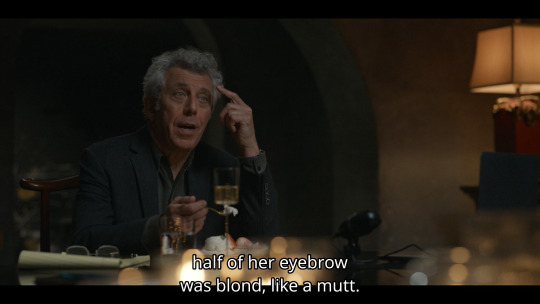
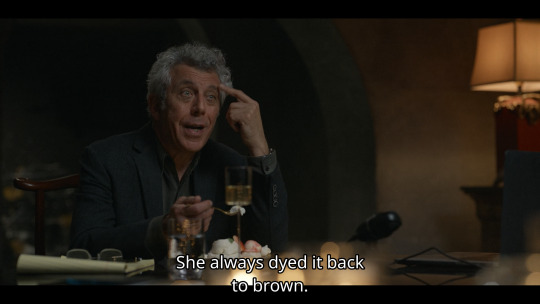
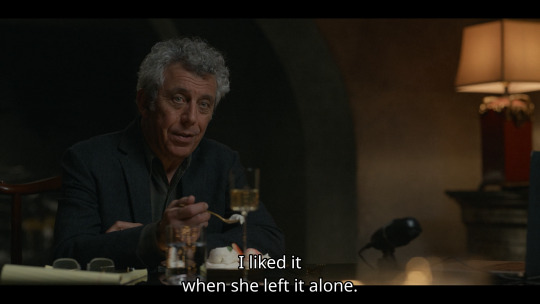
This scene - as well as how Alice in general is discussed - reminded many people of how Daniel in the books talks about Armand, such as this famous passage:

Parallels between Daniel's relationships with Alice and Armand in the books are obvious but i think they're just that, parallels. Both the sweet little scene where Daniel is talking about Alice's eyebrows and the book scene where he's talking about loving Armand not despite but because he's a monster reflect in different ways who Daniel is as a person; he feels drawn to unconventional and strange and sees beauty where others might not. He ended up in this situation with vampires too because he wanted to interview people who're rejected by the society.
If Daniel already had some sort of relationship with Armand in the past it makes sense that it would be associated with Alice in his mind. There may be an overlap between the timelines of those relationships. A memory of Armand rises when Daniel is reminded of Alice rejecting his marriage proposal, in the books Armand rejected his wish to be turn him into a vampire, which would've been something akin to marriage. I think Alice being real is much more compelling for Armand's character too, with Armand expressing surprising understanding and sympathy toward Daniel's wife rather than just speaking about his own experience through an imaginary woman.
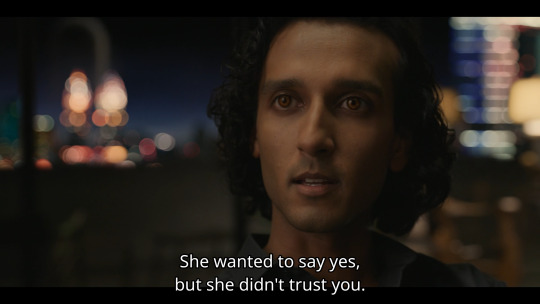
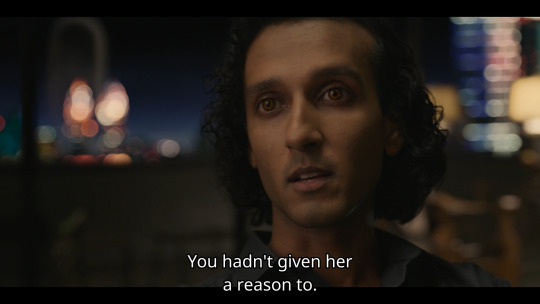
Completely putting aside Devil's Minion and is it a thing in the show or not, i think Daniel's family is particularly important to Louis' and Daniel's relationship. Something that hasn't technically been explicitly said but to me seems obvious is that Louis and Daniel strongly relate to each other as fathers. Many scenes where we see Louis and Daniel show vulnerability in front of each other have something to do with their partners and children. In 1.02 as one of the earliest examples of this Louis replicates the dessert Daniel had with Alice, trying to connect with him and his humanity through it, Daniel shares personal memory and they eat together in companionable silence.
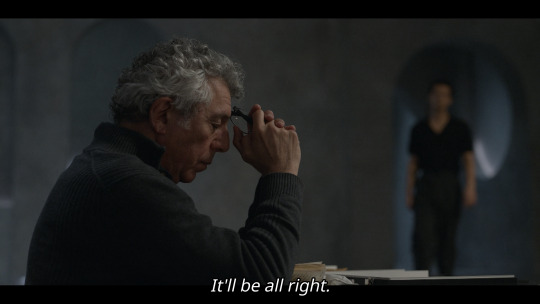
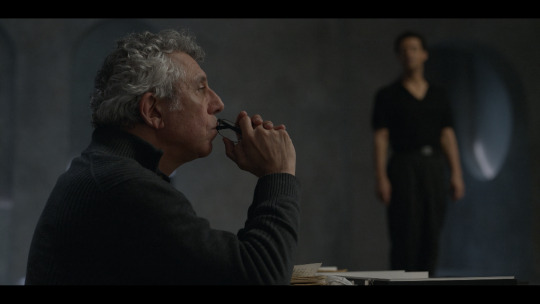
I would argue that Claudia, her memory, and Louis' relationship with her is the heart of the story in these first two seasons. Claudia entering the story in 1.04 marks the shift in the interview and Daniel's approach; he becomes both more combative and more emotionally invested. He has a strong reaction to reading Claudia's diaries, and it's not difficult for any parent to guess that he's also imagining her own daughters in similar circumstances to Claudia.
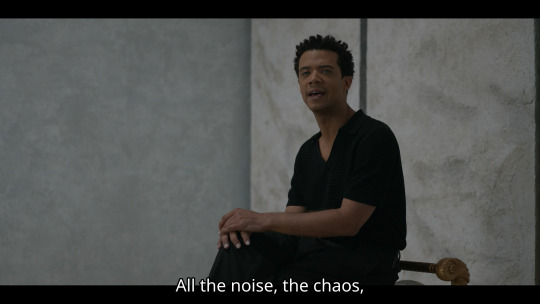
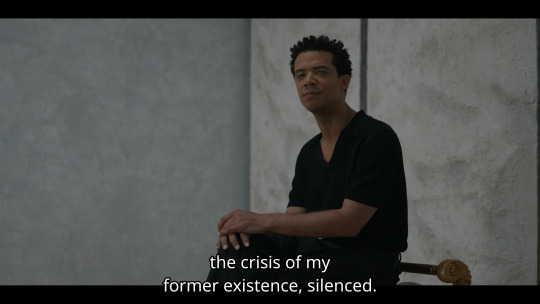
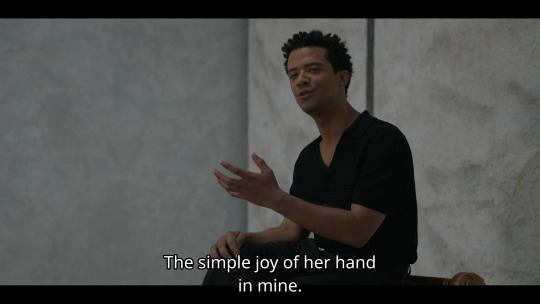
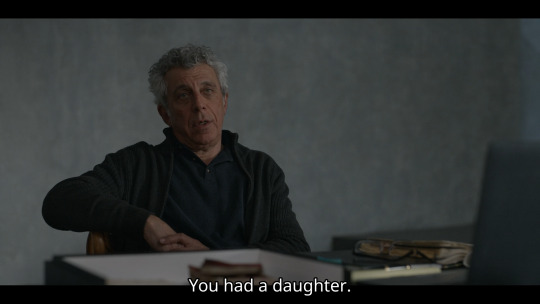
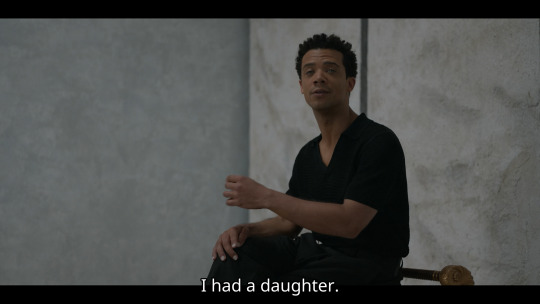
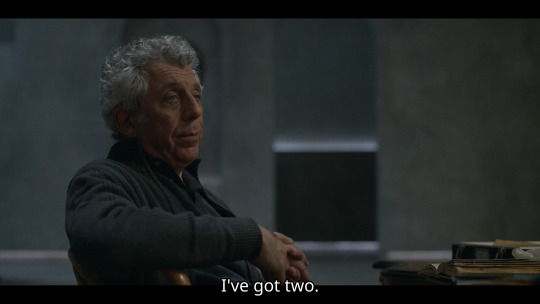
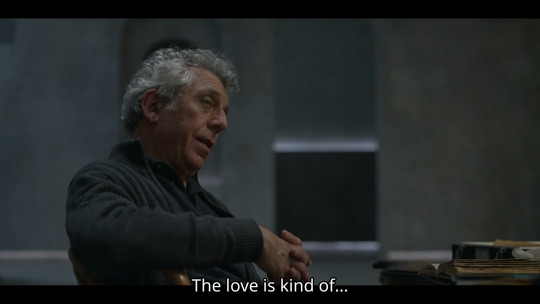
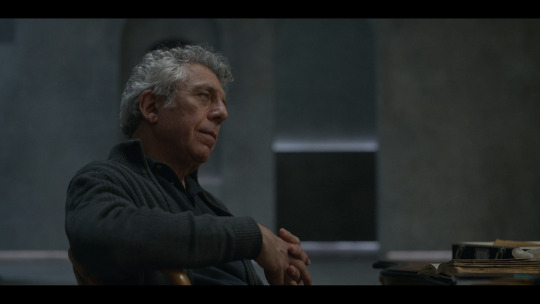
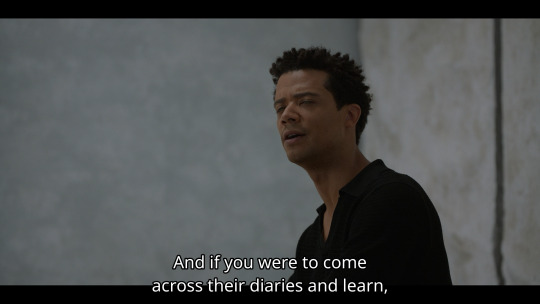
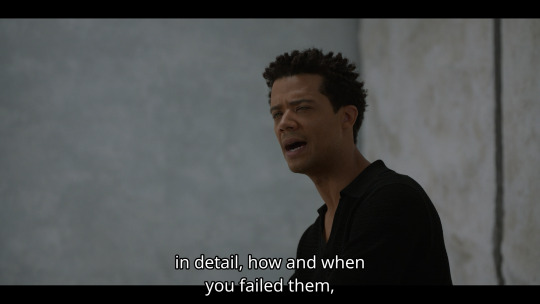
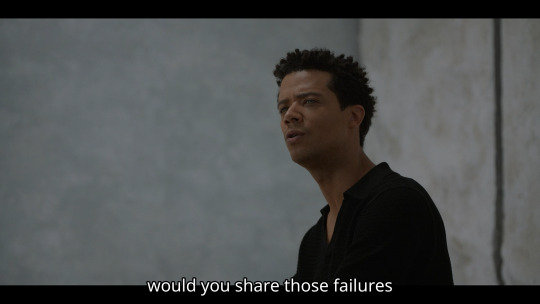
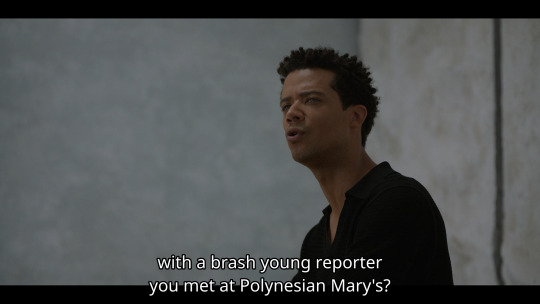
I think this conversation at the end of the episode (alongside Louis' speech to Daniel in San Francisco and them remembering it in 2.05) is the most important scene between Louis and Daniel. They share the understanding what it feels like to have children and love them so much you don't even have words for it, but still fail them. It's not a coincidence that in the original interview in San Francisco what leads to Louis attacking Daniel is Louis telling the story of Claudia leaving alone and Louis going back to Lestat, and Daniel acting dismissively and clearly not understanding why this is so painful memory to Louis. Daniel was young, stupid and high - and he didn't have children yet. Daniel now wouldn't act like that when hearing this story, and he doesn't in 1.06 when hearing it again. And notably when Louis says that he would now agree to turn Daniel, Daniel says he doesn't want it anymore and specifically mentions his daughters as one of the reasons. Having to watch your children die before you is the most horrifying thing in the world. It's something Louis had to go through and Daniel wishes he never has to, even if vampirism still intrigues him.
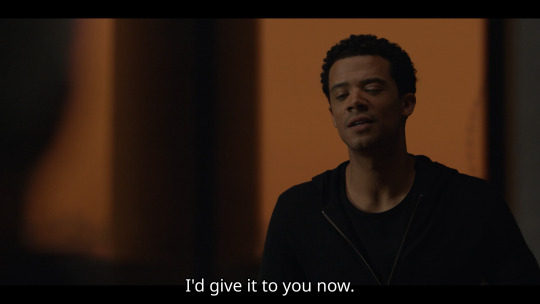
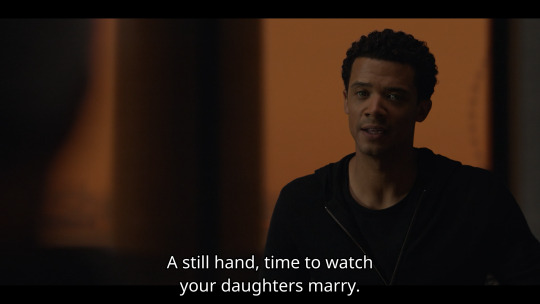
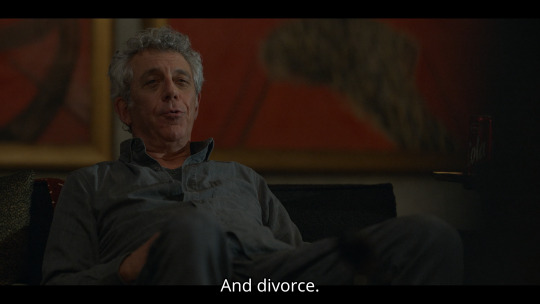
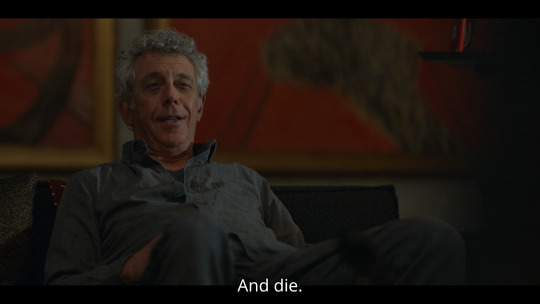
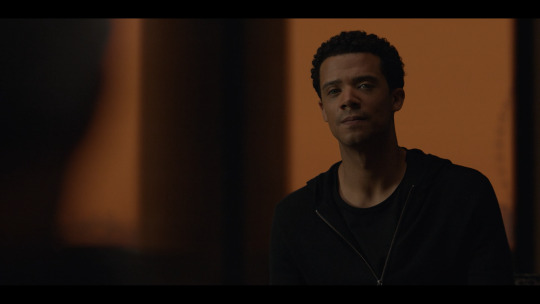
Daniel realizes quickly that it all comes down to Louis' feelings of guilt and shame about failing Claudia and his inability to protect her, because he has similar feelings about his own daughters. Louis' story unravels in s1 finale because Daniel recognizes that Louis' more palatable narrative around what happened with Claudia isn't fully true. Daniel carefully read through Claudia's diaries and tried to learn to understand her, and he positions himself as someone who's trying to defend her integrity and reveal the injustice that was done to her. This is again about Daniel's own children as much as it's about Claudia. He knows that he's a bad father, his daughters don't talk to him anymore and it's implied that he neglected them when focusing on other things that interested him more. When Daniel defends Claudia he's on some level trying to rectify his own mistakes and when he calls Louis out he's also voicing his own self-loathing.
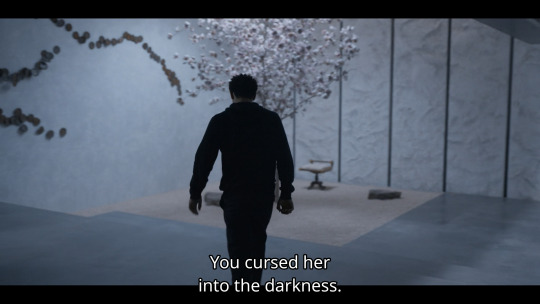
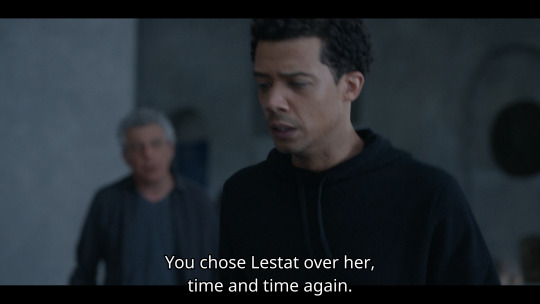
Eric Bogosian remarked that the scene in 2.01 where Louis cries and thanks for Daniel for helping him to remember that Claudia could dream is another shift in their dynamic. Daniel looks at Louis with genuine concern, and after that he tones down his usual sarcasm and jabs significantly. Daniel, again, can sympathize with how important this is for Louis. There's a new sincerity and empathy in their interactions. Sometimes the audience forgets that this story is ultimately about Claudia, but Daniel hasn't forgotten it since he first realized it. They're trying to understand together what happened to Louis' child and everything that led to it. I think if Daniel wasn't a father he would've acted differently, and Louis wouldn't have trusted him in the same way either and been able to share his and Claudia's story. I think this shared sorrow, love and guilt they feel as fathers is one of the most crucial parts of their connection.
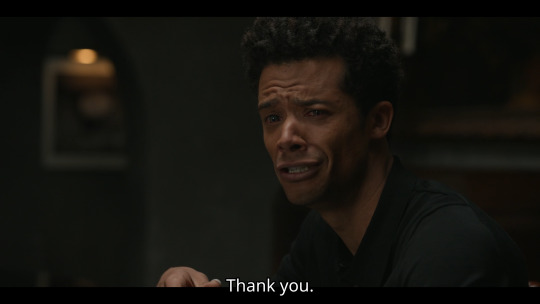
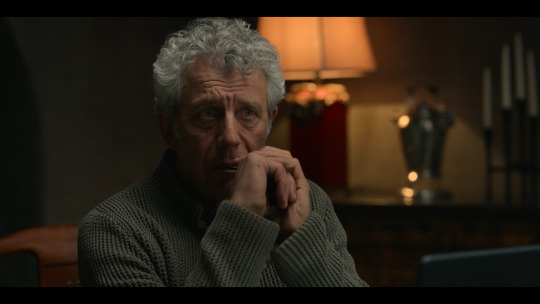
#iwtv#iwtvposting#danlou#this is mostly about daniel and louis but a bit of armand too#daniel molloy#interview with the vampire
241 notes
·
View notes
Text
Damon and Diana: Design Comparison
Gear up everyone because this is a LONG post. The parallels between Damon and Diana are plentiful, so this post just sticks to just their design elements or else it would never end. Spoilers beneath the cut.
1. Names
The name Diana in Hebrew means “giving light”, “shining one” and “luminous”, but also is associated with leadership. While Diana already acts as a light for many of her classmates, Damon included, I think her leadership role will begin to bloom in Chapter 2.
Meanwhile, the name Damon means “to overpower”, “to conquer”, “one who subdues” and “to tame”, which associates him with power and control as he displayed in the courtroom. Additionally, these terms can be associated with leadership qualities. Damon can also be associated with “guardian spirit” and “loyal friend”.
When comparing the two names to each other, the parallels become clear. Each represent a different approach for how they want to lead the killing game. Diana represents a light/faith-filled and optimistic approach while Damon leads with a more cautious and pessimistic approach. Diana protects everyone while Damon protects those he needs to. Diana is unable to accuse anyone of being capable of murder, as she’s still to inwrapped in light while Damon has the swift execution of power capable to make the decisions to find the culprit, and even turn on those he trusted if needed. Both need each other- Diana’s strength lays in faith and charisma while Damon’s lays in doubt and decision making.
As of Chapter 1, the two embody each other’s weaknesses. If that will change, it could go either way! In an ideal world, the two could grow and learn from each other (a balance if you will), but I think due to Diana’s idolized version of Wolfgang, and Eva’s betrayal of Damon, the two are going to go further down their own paths, convinced that they’re right and the other is wrong.
2. Appearance
Diana’s main colour palette is primary colours, given the red is substituted with the diluted shade of pink. Additionally, the neutral colour she’s paired with is white, which again aligns her with that idea of light, or brightness.
Meanwhile, Damon’s main colour is green, a secondary colour! First and foremost, it’s outside the primary wheel entirely, creating contrast with Diana’s design. It’s also worth noting that the only yellow in Diana’s design is her bowtie above her blue shirt, right where Damon’s green tie goes. Additionally, whereas Damon’s eyes are green, Diana’s are a lighter magenta, which are opposing colours on the colour wheel. The same applies to their hair colours, as Damon is blond and Diana’s hair is a darker shade of magenta than her eyes, pushing it closer to purple, which are also opposite colours on the colour wheel. For those unfamiliar with the wheel, that means the colours, though opposite, compliment each other when paired together!
The same opposing pattern can be found with Damon’s neutral colour scheme, as a majority of his design is dark neutral colours like grey, black, or brown, which opposes Diana’s prominent neutral colour of white. However, they both do have a white undershirt which is a nice similarity between the two, and both are even wearing vests though of different styles


3. Ultimate Talents I would also argue their talents parallel each other! If Damon’s talent is to convince people of something via words (telling), I would say Diana’s talent is to convince people of something via appearance (showing), both two different ways of conveying information. Damon’s talent is pretty self explanatory. He is the Ultimate Debater, responsible for convincing action through words. Diana’s talent though, as the Ultimate Cosmologist, I don’t think has had enough spotlight. Diana’s talent is good enough to convince people she’d never been sliced with a knife- what is that if not convincing via appearance, showing rather than telling? Damon’s talent embodies telling, while Diana’s embodies showing.
Additionally, there's how the two perceive their talents and others. Where Damon is confident in his own talent but thinks everyone else's talent is useless, Diana has the opposite ideology where she downplays her own talent but uplifts everyone else's.
I think it’s really interesting how much their designs compliment each other and I absolutely cannot wait for Chapter 2 to see them interact as protagonist and antagonist.
#damon maitsu#diana venicia#I love you Diana please don’t die#Damon you have plot armour I believe in you#project eden's garden#p:eg#p:eg chapter 1#project edens garden#project eden’s garden ch1#project: eden's garden#pjeg#character study#character design#character analysis#eve’s ramblings
106 notes
·
View notes
Text
Those Late Summer Nights | Chapter 26
satoru gojo x f!reader x suguru geto
plot: moving to the city from a small town was no easy feat, especially to start teaching as a jujutsu sorcerer — this is a yandere story with many dark themes, reader caution is advised.
summary: suguru’s curiosity gets the better of him, meanwhile shoko executes the plan regardless.
masterlist • ao3 • chapter directory • previous chapter • next chapter >
Chapter 26. Confrontation
Suguru froze as he took on the call, unable to form a proper reply from the moment Satoru’s voice reached his ears.
“It’s me,” the greeting echoed, Satoru’s voice calm and measured as he greeted him, as if he was simply calling to catch up.
Despite just barely receiving a half whispered “what?” from Suguru, Satoru continuer regardless, diving into his pool of self-realisation, claiming to have finally understood. All of the hatred, the blame, the fear, and everything else in between. He finally got it. It just took him a couple of years longer, that was all. Suguru didn’t offer much between hums and idly uttered sounds as his friend spoke, latching onto the contact with the intention of later betrayal because what a fool he would be for letting an opportunity like this pass him by.
After all, Satoru wasn’t just reaching out. No. He was willing to cooperate—to join forces—to even go as far as to share his location.
Now, Suguru had always emphasised a certain point in particular that made him different from Satoru, and that was that he never trusted the six-eyes user around you from day one, projecting his only poorly appointed insecurities onto you from the moment you let him get closer. He shouldn’t have shut you out from agreeing to take Satoru to your small town, nor should he have been so standoffish to begin with at all. Yet, perhaps it was a rite of passage of sorts since that’s when it became clear to him personally that he was never going to share—not even with him.
“Of course,” Suguru absentmindedly nodded anyway, trying to swallow away his otherwise distracted demeanour. His mind was still reeling and he couldn’t believe that such an opportunity wasn’t something he had to search for, not commit a single shred of effort towards.
Either way, he continued to listen all the same. A wake-up call, indeed. The world was long overdue for the ugliness that it was capable of creating; sorcerers who carried out the weary burden of dusting away the errors of the uninformed should not suffer the same way.
Everything was cyclic, after all, and everything in this world had a risk of repeating itself between the parallels of existence. Just what kind of guardian would Satoru have been, the thought, if he allowed Megumi to fall under the same curse of appointed responsibility without a reason—likely the same mentality that Suguru had when he chose to distance the girls far away from a life like this.
Suguru listened some more, nodding off to Satoru’s manic rambling, hastily scribbling off any information that bled past the receiver. An address and some further directions were parted onto paper, and just as the call had ended, Suguru froze again.
He might have a chance to see you again.
He might have an opportunity to be selfish once more.
The idea, he wasn’t going to lie, had been on his mind for a while—joining forces with Satoru—although, just hearing Satoru give into the madness still made him pause. Satoru didn’t get it the same way, he concluded. However, Suguru did still want you back, so he would go along with it all, even if he was potentially getting involved in something highly questionable. It wasn’t as though he was truly stabbing anyone else involved in the back; he’d even let Shoko know, who would let the others know, but only what was essential to hear.
Of course he’d bend the truth or hide the more intricate details, because if he was to succeed in leading Satoru on, then potential discovery of betrayal had to come at a surprise.
It wasn’t like Satoru deserved such care though, after all, he orchestrated this whole mess to begin with.
Suguru just thought that if Satoru could be selfish, then so could he.
He’ll reconnect with you—or at least try to, and if the shoe didn’t fit, then—he’d do the right thing.
(Or so he hoped that he would.)
Suguru let out a deep breath again, going over the information gathered from the call, finding it a touch annoying with just how careful he was being. In a way, he supposed that he did get it, given that the two of them, despite working separately, were committing a serious crime. Especially himself, though Satoru wasn’t clean off the hook either. Whatever Suguru had inflicted upon you was equally, if not worsely repeated by his friend.
The next hiccup was having a safe place to leave his found family, what with the start up of the cult being a little too fresh for his liking. Other sorcerers who shared his vision were still not as trustworthy as those he knew well for years, so he took a chance, leaving his girls with Shoko. He really hoped that he wouldn’t be making a mistake though, considering everything else they had been through. Shoko wouldn’t hurt them, he deducted—she just wasn’t like that—so he gambled it.
Shoko, when contacted by him only just about registered what he was talking about too, deciding to push her quickly building concerns down as soon as the questions entered her mind. Of course, she would play the role of reliable middleman friend, promising to pick up his adopted daughters tomorrow, perhaps even after picking up Megumi on par with the plan, because she was damned if they were both going to be acting alone. She didn’t buy Suguru’s claim of just ‘checking out a hunch’ the next day, knowing that it likely was going to be related to Satoru one way or another.
For that reason, she made a decision with Yuki later that night, because if he’s been shady from the beginning, then she had no reason to tell him the full truth of just what they were both up to either.
The only way that this ended was if they both played dirty.
With no exceptions.
~~~
The next morning arrived at a painstaking pace; Shoko was already up in the early hours, her eyelids drooping shut from a restless night. She couldn’t get to sleep due to the nerves overwhelming her ability to think, but now that it was all in motion, she felt abuzz with an almost panicked sort of energy. Somehow elated, though also, terrified. She was encouraged by the gentle push of Utahime either way, who gave her a gentle nudge forward, reminding her that “it was now or never,” emphasising the point being that their second chance was here, so no matter what happened, it was necessary to succeed.
Yuki, just as discussed the night prior, was already on Suguru’s trail too.
Keeping just far enough away to not be detected by Satoru who potentially lingered closeby.
(She didn’t buy his excuse either.)
Shoko reluctantly stumbled forth, exchanging the information with the sitter that she had by now, known for years, them foolishly (or naively) trusting her with almost stupid ease when she offered with Satoru’s blessing, to take Megumi out for the day and by midday, it was time for the others to follow suit.
Suguru otherwise kept his mouth shut for the duration of the day, thanking Shoko for keeping an eye out on his daughters with a curt message sent over a text message while informing Satoru at the same time that he was on the way. Truth be told, he wasn’t sure if he could pull this off correctly, though. He could wear a decent poker face around everyone else, but his long, good friend was different. He wondered just how much information could be exchanged through the means of the six-eyes too, if somehow his cursed energy would seem off when he met with him, if that somehow would give him away.
(But he would keep trying all the same; succeeding was mandatory for him too.)
He was out a little before lunch, leaving Mimiko and Nanako fast asleep and ready for Shoko’s arrival just as discussed so that she couldn’t follow him. Utahime was the exception of that rule, but neither Shoko nor Utahime possessed an equally comparative technique to take him on should things go south. He considered Yuki, but he couldn’t pick up on her cursed energy nearby, nor could his dispensed cursed spirits pick anything up when sent off to scout either, so hopefully she was just as clueless as the others.
He still remained suspicious though, just in case. Yuki, after all, wasn’t like everyone else. She, like him, chose to lead her own path. She wasn’t just good at being elusive, but she also just straight up evaded Jujutsu society as a whole while still managing to reap the benefits of a sorcerers’ salary. Suguru as a result, couldn’t fully trust her to keep her hands completely off as a result, because if she was able to get a hold of Shoko so easily after being contacted once, then she likely already had her eyes on him.
Or someone else did.
Should he be followed, he decided at the cost of his own dignity, perhaps that he should cave and pretend to be surprised. He could very easily claim that he was desperate, playing the part of a man set up, hoping that if faced with such a situation that involved Satoru’s presence that he would play along, or if anything, that Yuki would let him off the hook.
Perhaps this whole thing was too manipulative though, or close to being something he disagreed with, but it was essential to his success to consider different outcomes.
Upon arriving at the address given to him too, Suguru sucked at his teeth. He kept seeing houses like this; buildings that harboured broken hope and deceitful promises, masquerading as family homes. He wondered just how much you had been through with Satoru too, figuring that this setup at least had to have beat the potential basement that you were likely kept in before. For a split second, he internally scolded Satoru for going that far, quickly dispelling the accusation, knowing fully well that should he have had the means, then he would have done the very same.
“You’re actually here,” Satoru greeted him straight out of the door, waring a dark navy blue jumper. It was cold outside, but not too much indoors from what it seemed, the gust of warm air spilling straight outside.
Suguru shrugged, trying to keep composed, but also casual. “Yeah, of course.”
“Alone?” Satoru asked.
“Yeah alone,” Suguru replied, forcing a joking tone, “I’m not dumb enough to take anyone with me.”
Satoru laughed, the way he did so seeming just as rehearsed, as if they both had practiced bullshitting each other. “Yeah, you wouldn’t risk something like that, would you?”
Suguru nodded as he walked inside, following Satoru into the home. He didn’t want to go back to mundane small talk, not with him. What he wanted was visual confirmation that you were safe, but you weren’t there, so much to his annoyance, he had to play along. For the most part otherwise, everything seemed to be in order. Satoru seemed well, albeit perhaps manic. Maybe he had you very close by but purposefully kept you out of bounds for his arrival. Given how this whole thing started, he didn’t quite blame Satoru for being so paranoid.
Just as they both had sat down in the living room, however, Satoru got a call, excusing himself to another nearby room so that he could remain out of immediate earshot, but keep an eye on his visiting friend. Suguru in the meanwhile mentally mapped all of the exits and how the house seemed to span with the corridors being annoyingly narrow. The house didn’t otherwise seem to go down with the foundation seeming pretty solid, so there was likely no basement this time around, which only left the potential area you could be in, being upstairs.
Satoru tore back into the room after a couple of minutes, looking a little agitated, or at least more than Suguru was used to seeing him as.
“Something wrong?” he asked.
“Yeah, uh, Megumi’s caught up in something,” Satoru quickly muttered out, swinging a coat over his shoulders, hastily grabbing his car keys before racing to the front door. Just as he was slipping on his shoes though, he paused and narrowed his eyes at Suguru.
Suguru blinked, feigning exhaustion. “Go ahead, I’ll take a nap while you’re out.”
Satoru hesitated but his love for Megumi won out, so he let out a frustrated sigh before making a tough call. “The downstairs is warmer, so you’re in luck. This place is freshly moved into though, so the upstairs is very messy, keep that in mind.”
“Yeah, I’ll stay down here,” Suguru lied, watching him leave. It must have been very dire if Satoru was leaving so soon, potentially leaving him within your presence. He couldn’t have trusted him either, leaving Suguru a little more suspicious than usual.
So, just as soon as he was certain that he was far enough away however, Suguru sat upright with a start, having an off feeling about the whole thing. Curiously, he picked up his phone to give Shoko a call, just in case, finding it suspicious when she didn’t pick up the phone.
Surely the two weren’t connected, right?
He tried again a couple of minutes later, sighing a deep breath of relief as soon as the number pulled through, hoping that it was just a poorly timed coincidence in the midst of everything else that was going on.
“Please tell me you haven’t done something stupid,” Suguru spat, cutting to the chase right away.
Shoko retained a neutral tone as she replied to him, despite reeling on the other end, already knowing exactly what he was referring to, “Whatever do you mean?” she asked. Technically speaking, this was on route with the plan still, if Suguru was quick to notice that something was up not too long after Satoru had been called away from his location, then he was likely close to him—to you—so Yuki’s hunch about this whole set up wasn’t that far off at all.
Realising his mistake, Suguru tried to tone it down. “What? Nothing. How are they doing? Giving you any trouble?” he paused, unable to resist backtracking. “I got a text from Nanako, was all,” he lied, hoping she’d slip.
(She did.)
Shoko half scoffed, not buying his excuse in the slightest. “They’re both safe, I’m just taking them out for the day.”
“Anyone else with you?” he pushed regardless. “Megumi, perhaps?”
“You’re so bad at keeping it together,” Shoko jabbed, almost disappointed that he caved so quickly, though she supposed that she did have the best sort of leverage over him currently, since he had everything to lose, “look, just call it insurance—”
“—insurance, you’re shitting me, right?” Suguru interrupted.
“They’re safe…” Shoko hushed, as if trying to keep them away from the call, keeping her voice low, “but you know that I can’t trust you to pull something weird, not after everything else you’ve put everyone through.”
“I’m not the one who abducted a whole human being,” he defended, standing up, slowly making his way upstairs, careful to not make a single step creak.
“Oh yeah, because being a rapist is so much better,” she jabbed in the same whispered tone before returning to a level tone, “look, I just need to make sure you won’t be the one doing anything stupid. I can’t just have you dive in and make a run with her, the same way I can’t have Satoru do anything either.”
“Should have guessed you’d do something like this,” Suguru sighed, opening up the first empty room, “stings though, I’m trying to do better.”
Shoko scoffed again. “Shit, I’m sorry for not accounting for your feelings,” she sassed in a sarcastic tone, “doing better?” she caught on. “What a joke, Suguru. You can try to fix things all you’d like, change up your game, whatever, but it’ll always be forced no matter how you look at it. You took a perfectly good life and ruined it before she could even learn to be on her own,” she spat, sighing a deep, shuddering breath as it all came crashing down, “god, I regret the day that I ever tried to bring her into our circle, you’re both so fucking horrible.”
He seethed all the while as he listened to Shoko unload everything about him, her voice full of spite, continuing to open up doors all the same. He supposed that she wasn’t wrong, technically, that he had been unfair. It wasn’t your fault for existing, because all you did was show up at the right time into the company of the wrong people. The obsession he forged was his own, wanting you to the point where he began to lose his own identity.
He paused as one final door remained.
A locked door at that, with the handle not giving way at the first twist. Applying a fraction of his strength though, he broke into the room with urgent force, hanging up on Shoko from the moment he landed his eyes on you.
You opened up your eyes, startled from a nap from the looks of it. You looked weaker overall, your face lacking its usual lively complexion. “Suguru…?” you greeted, almost dazed, but mostly confused by his sudden appearance.
Just why… was he here? With you?
Satoru didn’t seem to be close, so what was going on exactly?
He didn’t reply but instead took a step forward into the room. The shoe fitting be damned, he wanted to be selfish; he wanted to reconnect, to have you near him again, beneath him, with him—his pretty little poison—ready to be bottled up with him again, so intoxicating, so sweet.
But then you spoke again, leaving him at a loss for words.
It wasn’t that you meant for the first nextto slip out of your mouth to be something so vile from the moment you saw him, but it was all that had been in the back of your mind from the second that the news left Satoru’s lips. You hoped for it to be a lie and yet, the look on his face and the lack of denial told you everything you needed to know.
“Why did you kill my parents, Suguru?”
#chapter update#yandere jujutsu kaisen#yandere gojo x reader#yandere geto x reader#yandere gojo#yandere geto#jjk#jujutsu kaisen#satoru gojo#suguru geto#yandere x reader#jjk x reader#x reader#dark jjk#jjk dark content#yandere satoru gojo#yandere suguru geto#yandere imagines#gojo#geto#jjk fanfic#yandere jjk x reader#jjk yandere#yandere jjk#yandere x female reader#xposted to ao3#yandere satoru x reader#yandere suguru x reader#suguru geto x reader#satoru gojo x reader
61 notes
·
View notes
Text
CEM = Another Journey to the Philosopher Stone?

So, a quick RWBY thought! Thanks to @hamliet's wonderful meta, we know RWBY is an alchemical story, which metaphorically illustrates how to create the philosopher stone. This stone symbolically brings life, which means that:
RWBY will save the world (the macrochosm)
Ruby (and the others) will self-actualize and grow up (the microchosm)
The journey to the stone is a process made of 4 phases + 1 quick moment:
NIgredo or the Black Phase
The Rainbow phase - the quick moment
Albedo or the White Phase
Citrinitas or the Yellow Phase
Rubedo or the Red Phase
RWBY plays with these phases, as it associates each one of the protagonists to them:
Blake is the Nigredo
Weiss is the Albedo
Yang is the Citrinitas
Ruby is the Rubedo
Jaune Arc and his team are the Rainbow Phase
All the phases together make the stone (RWBY = ruby = the stone). So, our main team is a metaphor for the journey towards the Self (the stone), as they are all growing up together. Team JNPR too ties into this, as another metaphor for alchemy's final product is a tree (JNPR = Juniper + Pine = pine). So, our 8 protagonists are all part of this trasformative process, which will lead them to grow up and save the world.
Still, there is another team, which might tie into this:

Cinder, Emerald and Mercury might be tied to the process of creating the philosopher stone themselves. In which way?
First of all, let's consider volume 9 for a second. Our Little Red Riding Hood faces three different parts of herself in the form of three weapons:

Penny's sword is green, like the prima materia. It represents the child-self and Ruby's past self. It is Ruby's initial form that she is leaving behind.
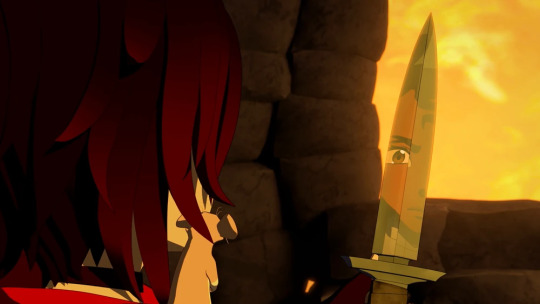
Alyx's knife is gray, like mercury. It represents this metal, as mercury is associated with both poison (Alyx poisons Jaune) and medicine (Alyx heals Jaune). Similarly, Jinxy asks for the knife both your saddest and your happiest memories. It represents Ruby's present self and the transformation she is undegoing.
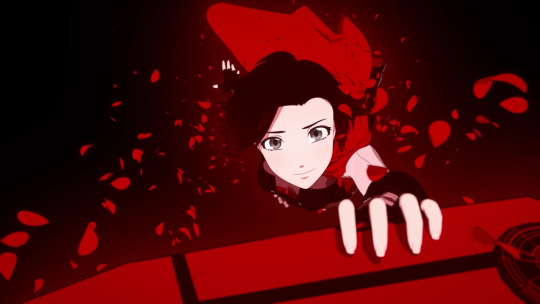
Crescent Rose is red, like the philosopher stone. It also represents Ruby's final self. She is still growing up (Crescent), but will eventually become her own person (a Rose).
In short, these three weapons are linked to three different substances that are key in the alchemical process: the prima materia (green), mercury (gray) and the philosopher stone itself (red).
Well, interestingly these three substances share CEM's colors:
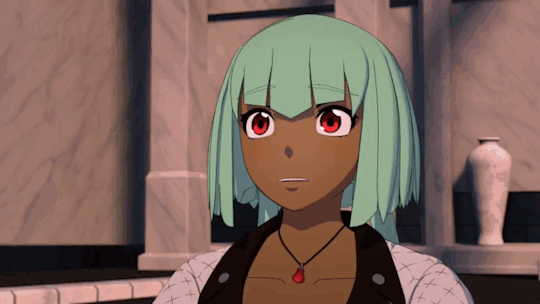
Emerald is green like the prima materia. She is also the first one to start a redemption journey and to make positive progress in her arc.
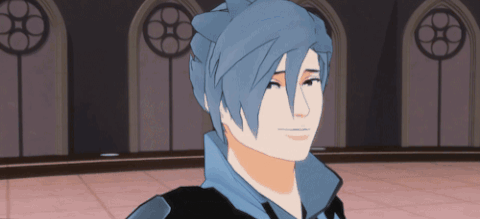
Mercury is gray and is obviously linked to the metal mercury. He is set up for redemption and his arc should be symbolically important for the story as a whole.

Cinder is red and she is obviously going through her own personal journey of self-actualization (even if it will probably be a tragic one). She is meant to be Ruby's foil and parallel, after all. So, she is the cinder, which becomes the stone. She will probably be the last one of CEM to get her redemption.
Now, this could be a coincidence, but it is fun to theorize about it! What is more, another way to describe the philosophical process is this:
The prima materia is separated in sulphur and mercury
Sulphur and mercury come together again through a chemical wedding
They give birth to the stone
Right now we have Emerald being separated from Mercury:

Their separation will probably lead to a chemical wedding between them, where they unite again. At this point, they will probably face Cinder together and help her in her arc. After all, they are her slippers!
So, CEM might just be the third team, which will self-actualize and help saving the world!
Speaking of which I wonder if Somewhat's short story in RWBY Beyond foreshadows the ending of Cinder's arc. The story is a short fairy tale, which tells Somewhat's Adventures in the Ever After. It is clearly foreshadowing of future events, as it teases Ruby and the others going back to the Ever After. That said, it also clearly works as foreshadowing in a metaphorical sense. Especially since it is Ruby herself who narrates the story.
So, Somewhat (aka Ruby) is asked to fix what's wrong in the Ever After (aka Remnant). As they try to do so, they meet several characters:
-They visit the genial gems, who are now taking care of themselves. This mirrors Ruby's own arc. She tried to spread herself too little for the sake of others. Still, she is now able to prioritize herself when she needs it. (microchosm)
-They visit the market place, where everyone has come together after the Jabberwockys' attack. This mirrors Remnant's situation. After Atlas (and Vale)'s destruction, humanity will come together against Salem. (macrochosm)
-They visit the Red Prince, who is now alone after having sent everyone else away. Somewhat and the Prince play a game, as they chat. Somewhat tells the Prince it is not fair his purpose is to win:
Somewhat: "That doesn't seem very fair. What if my purpose was to win too?" The Red Prince: "Such is the way of our life" Somewhat: "What if it doesn't have to be?"
They add they could change their purpose and teach others how to win:
Somewhat: "Who knows? Maybe you could teach others to win."
In the end, Somewhat wins, but the Prince thanks them and says he has learnt a lot. It is also implied the Prince will ascend and become something new. The narration ends by saying "there was one less wrong thing in the Ever After".
-Somewhat goes to the Abandoned Acre and here is where the story ends with a surprising creature popping in front of our hero. (This part may allude to a final confrontation with Salem or with the Gods)
Now, I believe the game between Somewhat and the Red Prince foreshadows Ruby and Cinder's final confrontation. Sure, you can read the Prince as Salem too, if you want to, but I personally think Cinder makes more sense.
First of all, the Red Prince and Ruby's game in volume 9 mirrors RWBY's story up until Atlas. Atlas itself has a strong chess-motif, whose whole purpose is to show everyone thinks Salem is the chessmaster, but it is actually Cinder playing. To be precise Cinder wants to be a player, but she can't stop being Salem's most precious pawn aka the Queen. This fits with the Red Prince. He is both a regressed Red King and the one playing. Similarly, Cinder is the Black/Red Queen, who wants to play her own game.
Secondly, the Red Prince gets corrupted because of Alyx's betrayal. After this, he meets Ruby, but projects his own hurt on her and lashes out. Similarly, Cinder was hurt by Rhodes and is projecting this betrayal on the whole world. She is especially fixating on Ruby, whose eyes negate Cinder's newfound power.
Thirdly, the Red Prince's purpose is to win. In short, he is obsessed by victory. The same goes for Cinder, who thinks she needs to be more powerful than everyone else to have value. This leads her to enter into conflicts with others, whereas she should build bonds.
Finally, Somewhat tells the Prince they should find a new purpose. The idea of destiny or purpose is linked to the theme of "Choice" since volume 3. Cinder is meant to fully bloom into the Maiden of Choice. So, it makes sense for her to finally find her own purpose. Moreover, Somewhat saying the Prince can teach others how to win might foreshadow Cinder's important for RWBY's final victory.
Salem: You are the key to our victory.
Cinder is the one who will decide who wins and who loses.
I also think Cinder will be the Red Death aka the final death needed in an alchemical story to solve the conflict. The Red Prince ascending might foreshadow this.
These are just some thoughts on how volume 9 might have foreshadowed the rest of the story in different ways!
#rwby#rwby meta#alchemy meta#CEM#cinder fall#emerald sustrai#mercury black#emercury#murder kids#my meta
43 notes
·
View notes
Note
Wait, does everyone like Stan in Stanland then? Do they still keep some of their original relationships (such as Fiddleford and Stanley being somewhat hostile but still care about each other) or do the relationships change quite a bit?
Not so much that everyone in Stanland likes Stan, more that on a deep level they're aware that he's responsible for their existence and so have varying levels of fondness for him as the person who created them and cherished them enough they didn't disappear, even as he moved onto different projects that expanded their world. Some characters are more attached, like Ford, while others are more antagonistic in a friendly way (Like the evil Dr. McGucket, mad scientist who creates robots and cries about his wife), while others don't like Stan but treat him more like an annoying younger sibling or overbearing parent they have to put up with but don't hate(as Stan created them, but their life kinda sucks?) like the various characters from Steve Pinington's adventures.
Bill, having evolved into a mega evil demon, also has these ingrained feelings towards Stan, but as he's grown and become more real they've sort of warped. Bill the evil cornchip was a joke character, who tempted Ford through his cheesy, crunchy deliciousness and tricked him into doing bad things (to parallel how Ford was betrayed in canon lol). Then he got an upgrade into a real threat and lost his chip status, instead being a conman demon, who exists as a looming threat in the world of Steve Pinington (who's just grown up Stanley, on the road alone).
So Bill's very happy his 'god' gave him a huge power boost! God must love him so much to give Bill this kind of power! Power enough to shape the 'real' world once the walls between dimensions crumble and Bills fully in the dimension, power equal (or even greater?) than gods! So it doesn't matter if god is yelling about how he can't do whatever he wants, because this is power Stan gave him, and Stan made who he is so it must be fine!
Unsure if Bill's trying to buddy up to Stan as a fellow 'god' (Reverse Princess Stan. Now Stan is Bill's dad), trying to usurp his position as god and eliminate (or more likely neutralize) the threat to his position, or straight up ignoring Stan, as BIll's real now and his godly powers are way easier to fling around, not having the limitation of 'realism' on them.
36 notes
·
View notes